COMMENCEMENT









A long-time Brown volunteer, Daniel has served on both the President’s Leadership Council and the Brown Annual Fund Young Leadership Council. In addition to donating each year since he graduated, he’s also earmarked money for Brown in his retirement plan.
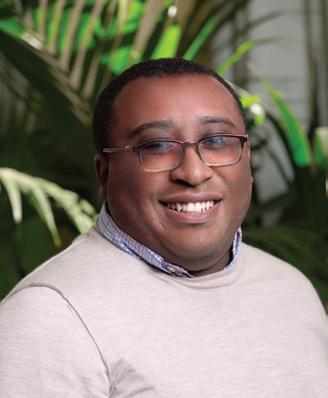
“A Brown education is transformational. Exposure to that which is beyond you—things you didn’t know, experiences you hadn’t lived, people you hadn’t met—changes you for the better. rough the Brown experience, thousands of students on College Hill learn and share knowledge that expands their world. Brunonia slowly opens their apertures, and what is le is the bedrock upon which they build lives of ‘usefulness and reputation.’ Financial support of Brown, for me, is a sound investment in that change.”
–Daniel J. Pipkin ’14You can follow in Daniel’s footsteps and support future Brown students with an estate gift—no matter what stage of life you’re in.

Contact the Office of Philanthropic Strategies and Planned Giving at 401-863-9119 or Planned_Giving@brown.edu to discuss your options.
Best wishes from Brown's Office of Philanthropic Strategies and Planned Giving
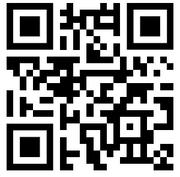
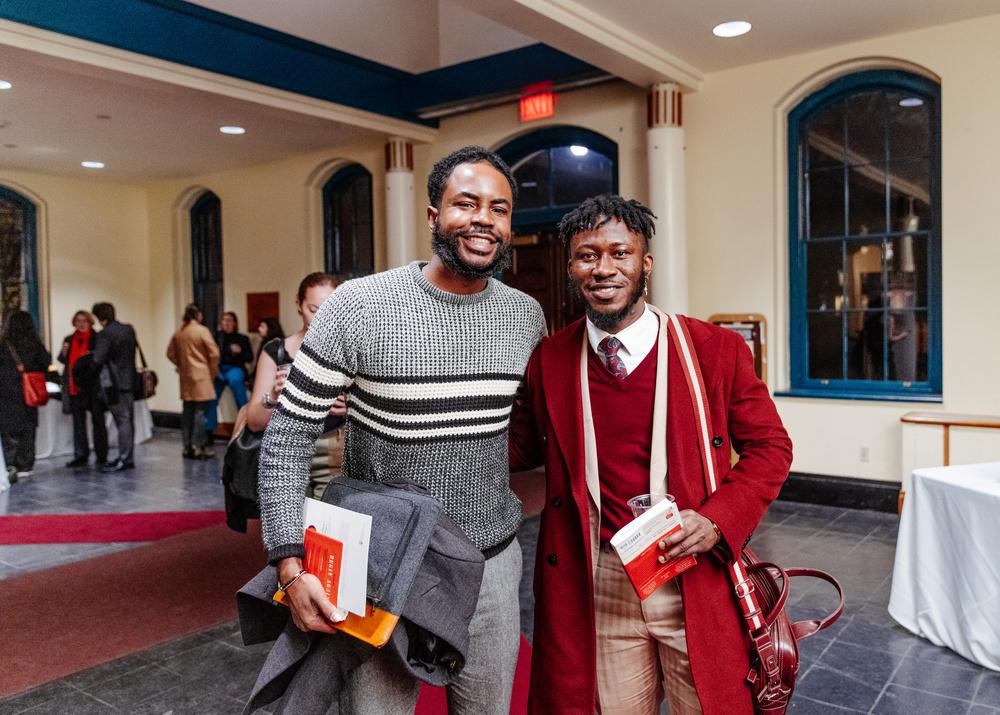


The mission of the Center for Philosophy, Politics, and Economics is to promote research and teaching that engages in scholarship across all fields that intersect through those three disciplinary and topical boundaries. Guided by an expansive appreciation for interdisciplinary and multi-method approaches, the Center is focused on advancing critical thinking and constructive civil discourse in the service of public and scholarly understanding of pressing social issues.
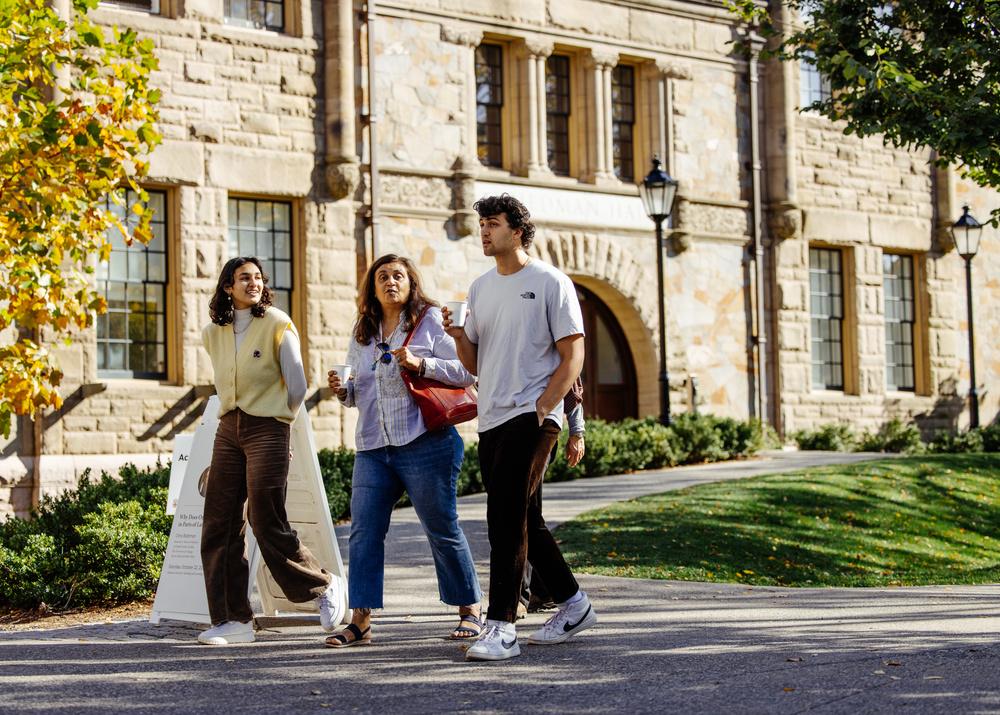
Each semester the PPE Center offers lectures open to the entire Brown community and the general public, as well as a series of smaller workshops that are by invitation. Invited guests are experts in their field from around the world who present diverse topics that are interdisciplinary in nature. The PPE Center offers three different venues for advancing important interdisciplinary scholarship and civil discourse: Janus Forum Lectures, Odyssey Lectures, and a specialized PPE Research Workshop.
Led by Director David Skarbek and Associate Director Melvin Rogers, the PPE Center is proud to engage with undergraduates in many ways. This includes teaching popular courses, such as Professor Ryan Doody's "Intro to PPE" course. The Center also supports two vibrant undergraduate groups, the PPE Society and the Brown Political Review To learn more, visit our website and explore our social media.
“Is it Greg or New Dorm?” — that was the headline of a Herald article from fall 2021. The concept was straightforward: Newer members of the campus community were calling the Vartan Gregorian Quadrangle “Greg” — an abomination to upperclassmen who knew the building as “New Dorm.”
The COVID-19 pandemic disrupted our campus traditions, as that Herald story noted, and the class of 2023 is the last cohort to have experienced Brown as it was before. In this version of The Herald’s Commencement Magazine, we sought to document the singularity of the class of 2023’s COVID experience, and to celebrate the once again thriving campus community we leave behind.
Many of the articles in these pages focus on how our campus has changed — from the decline and return of student activism to how pre-professionalism has permeated Brown’s culture. But this magazine also notes points of profound continuity — celebrating iconic campus traditions such as walking through the Van Wickle Gates and the ways in which the community has persevered these last four years.
At the helm of The Herald, members of this board have seen a change in
physical office space, four changes in leadership and countless changes to masking policies. With our last contribution to The Herald, we are most of all grateful that this organization has persisted through it all.
We are also enormously grateful to The Herald’s staff, who have given more than we could ever expect of them. We are grateful to the seniors who chose to contribute to this magazine, even as senioritis sank in. And we are grateful to the Brown community — students, parents, faculty, staff and alums — who have been reading these past four years.
When we come back to campus in the years to come, we know we’re bound to sound ancient when we say “New Dorm” or describe our time on campus during COVID-19. This place is bound to change, and we don’t think that’s a bad thing. Our college years have been as strange as they come, and we are grateful to have documented these unique eight semesters at Brown.
Editors’ notes are written by The Herald’s 132nd Editorial Board: Ben Glickman ’23, Benjamin Pollard ’23, Caelyn Pender ’23, Katie Chen ’23, Gaya Gupta ’23 and Jack Walker ’23 MA’23.
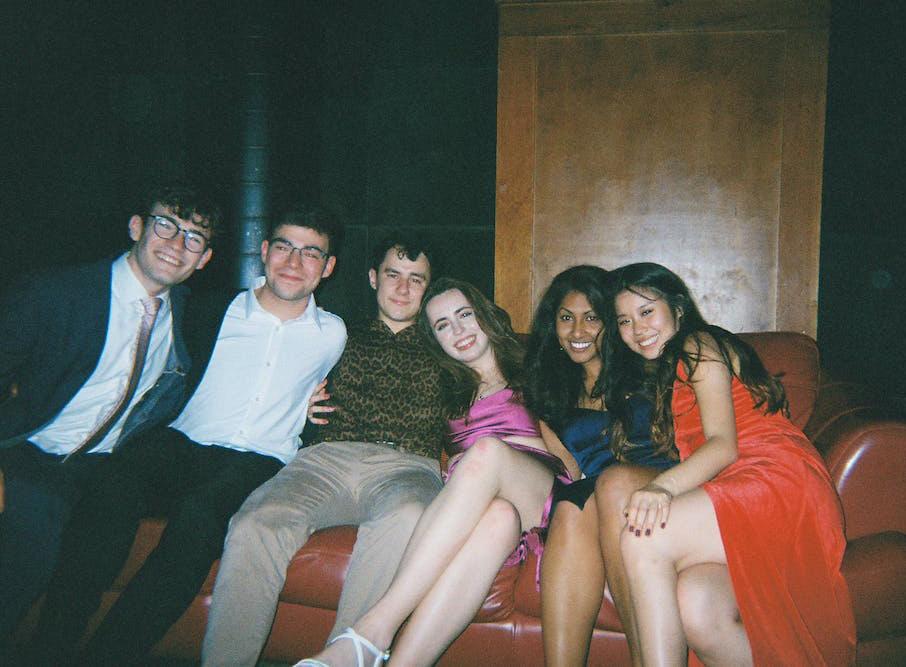
Celebrating what we’ve gained and lost these four years.
The Brown Daily Herald’s
6
Editors
Ben Glickman
Benjamin Pollard
Caelyn Pender
Katie Chen
Gaya Gupta
Jack Walker
Copy Editors
Brendan McMahon
Lily Lustig
Jack Walker
Designers
Neil Mehta
Ben Glickman
Jack Walker
Business Illustration
Joe Belfield
Andrew Willwerth
Cover Design
Class of 2023 senior orators
Neil Mehta
8
Rhea Rasquinha
Joyce Gao
Photography
Ashley Choi Lilly Nguyen
Honorary degree recipients
Rhea Rasquinha
From hobby to career: Seniors reflect on musical journeys
Robayet Hossain
7
Where’d all the archaeology majors go?
Sofia Barnett and Neil Mehta
Four years of student activism
9 10
Owen Dahlkamp
Hotel Brunonia: Off-campus housing and COVID-19
Ryan Doherty
Walking through the Van Wickle Gates
12 14
Sofia Barnett
Senior voices
Johnny Ren, Livia Gimenes, Elon Collins, Will Bednarz, Matt Rauschenbach, Jackson McGough and Lily Lustig
20
Kailiang “Kail” Fu ’23 and Margherita Micaletti-Hinojal ’23 will serve as senior orators at 2023 Commencement. Micaletti-Hinojal’s speech will discuss Brown’s reputation as the so-called “happy Ivy,” and Fu’s speech will focus on embracing failure.
The two senior orators were selected by the Commencement Speakers Selection Committee, wrote Lindsay Garcia, committee chair and assistant dean of the College for junior/senior studies, in an email to The Herald. The committee was composed of 10 members of the University community: Garcia, four undergraduate seniors and
without internet access.
“I didn’t have Wi-Fi, so I didn’t know (that) this process was going on until I got back from Cuba and … realized the deadline had passed,” she said.
After communicating with Commencement organizers, Micaletti-Hinojal was allowed to apply past the deadline. She found out soon that she was chosen as a finalist. From there, she auditioned and was selected.
Her speech, titled “On Chasing (Or Choosing) Happiness,” examines why Brown holds a reputation as the happiest Ivy League school.
When deciding on a speech topic, Micaletti-Hinojal realized that “a lot of the lessons I had learned in college were … about how to maintain a happy life (with) purpose and ambitions.”
She also drew upon her experience growing up in a “European bubble” — coming from a Spanish mother, an Italian father and French schooling — in which happiness and balance were emphasized over work and productivity, she explained.
Fu’s speech is about building “fault tolerance,” a term in computer science that refers to when a computer system continues to function when one of its components fails.
Fu argues that features of the Open Curriculum and Brown’s culture provide students with crucial fault tolerance, or an ability to persevere following failure.

The ability to take any course with a Satisfactory/No Credit designation, Fu explained, means that students can learn something new without worrying about failing academically. His experience recruiting for jobs also included many failures, he noted. Those failures served as assets in future applications.
speech at the PhD commencement ceremony last year. Bai and Fu are both from Zhengzhou, a city in China, and Bai helped Fu prepare for his speech, Fu added.
Fu said he hopes that by serving as a senior
five faculty members across different departments, she added.
For Micaletti-Hinojal, the selection process was complicated by a semester abroad. She couldn’t originally submit her senior orator application because she was in Cuba last semester
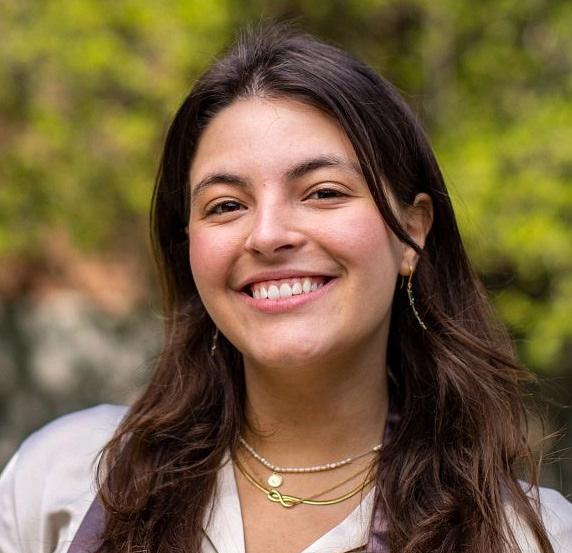
“What Brown gives us is fault tolerance,” Fu said. “If you fail, it doesn’t matter. You can try again. You have plenty of excellent opportunities on campus, (and) you have a group of people who embrace failures.”
Fu said he was inspired to become a senior orator by Jiuyang Bai PhD’22, who delivered a
orator, he can be a role model to other Asian students at American schools.
“If I deliver that speech, maybe people can see me, and other students will be inspired to apply for similar opportunities,” he said.
For Micaletti-Hinojal, the speech is an opportunity to convey the experiences of her and her peers who aren’t from the United States.
“It’s exciting to make something that feels representative of my and so many of my peers’ experiences, notably with the international community,” she said.
Plus, serving as a senior orator will “make my parents proud,” she added. “And I think that’s quite a universal child-of-immigrant experience.”
Kailiang Fu ’23, Margherita Micaletti-Hinojal ’23 to speak on happiness, failure
“A lot of the lessons I had learned in college were ... about how to maintain a happy life (with) purpose and ambitions.”
— Margherita Micaletti-Hinojal ’23
“
What Brown gives us is fault tolerance. If you fail, it doesn’t matter. You can try again.”
— Kailiang “Kali” Fu ’23PHOTOS COURTESY OF BROWN UNIVERSITY
Six distinguished leaders and scholars are slated to receive honorary doctorates during Commencement this year: Douglas W. Diamond ’75, Elaine G. Luria, Bernicestine Elizabeth McLeod Bailey ’68 P’99 P’03, Kevin Mundt ’76 P’11, Ruth Oppenheim and Gina Raimondo.
Honorary doctorates will be conferred May 28 at the University Ceremony by President Christina Paxson P’19 P’MD’20 on behalf of the Brown Corporation’s Board of Fellows, according to a University press release. While awardees attend the ceremony, they do not give speeches — the University typically reserves that responsibility for members of the graduating class.
Raimondo, the 40th U.S. Secretary of Commerce, was the first woman to serve as governor of Rhode Island. After growing up in Smithfield and attending Harvard, Oxford University and Yale, Raimondo’s early career involved work in venture capital, founding Point Judith Capital, an early-stage venture capital firm, in 2001. Raimondo was elected general treasurer of Rhode Island in 2010 and governor in 2015.

During her time in office, Raimondo focused on creating economic opportunities for Rhode Islanders, the press release said. She was appointed by President Joe Biden to serve as secretary of commerce starting March 3, 2021 and is focused on improving job prospects and pay, empowering entrepreneurs and supporting American workers and businesses in the global economy.

Currently a professor of finance at the University of Chicago Booth School of Business, Diamond won the 2022 Nobel Prize in Economic Sciences. His scholarship on banks and financial crises paved the way for modern financial oversight and expanded public understanding of how liquidity impacts banks and customers, according to the press release. Diamond was president of the Western Finance Association
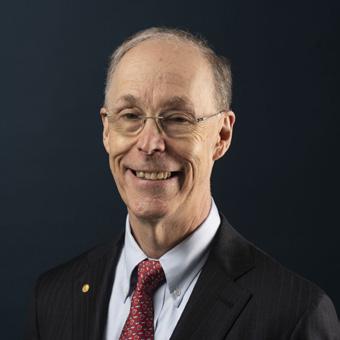
from 2001 to 2002, president of the American Finance Association in 2003 and previously an instructor at both Yale and the Massachusetts Institute of Technology Sloan School of Management. He is a Doctorate of Humane Letters candidate.
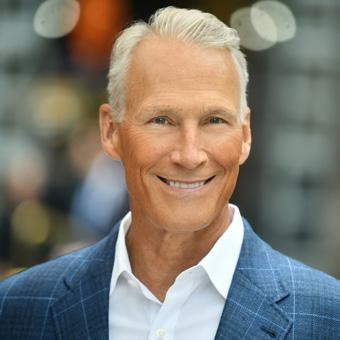
Luria served as U.S. representative for Virginia’s second district from 2019 to 2023 and is an accomplished U.S. Navy veteran. Serving in the Navy for two decades, Luria was a nuclear-trained surface warfare officer on six ships with six deployments to the Middle East and Western Pacific. She retired at the rank of commander in 2017. In Congress, Luria served as vice chair of the House Armed Services Committee, was a member of the House’s committees on homeland security and veterans’ affairs and served on the House Select Committee that investigated the Jan. 6 attack on the U.S. Capitol. She has advocated for improvements to veteran health — including by championing the 2022 PACT Act, which sought to expand healthcare for veterans exposed to toxic substances — and helped pass bipartisan legislation for advanced nuclear technology. Luria is a Doctorate of Laws candidate.
From her work in information technology to her leadership at the Pembroke Center for Teaching and Research on Women, McLeod Bailey’s legacy is wide-ranging. After working as an IBM systems engineer, she established McLeod Associates, a minority-owned consulting firm. McLeod Bailey is board chair of the Mary and Eliza Freeman Center for History and Community and a longtime advocate for diversity and inclusion. She is a founding member of Westport, Connecticut’s diversity committee and founding chair of the Pembroke Center Advisory Council’s Archives Committee, which focuses on highlighting gender history. McLeod Bailey is a former Brown trustee, honorary lifetime member of the President’s Advisory Council on Diversity and recipient of the Brown
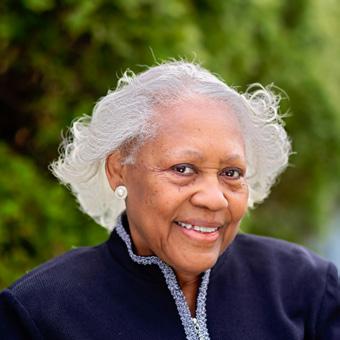
Bear Award, the highest volunteer honor of the Brown Alumni Association. McLeod Bailey is a Doctorate of Humane Letters candidate.
Beyond his experience as managing director at Vestar Capital Partners and his work overseeing consumer product and distribution-based business investments, Mundt has served on more than 25 corporate boards and was a Brown trustee from 2011 to 2017. In his time at Brown as an undergraduate, Mundt played on the football team and served as captain of the track team, earning All-Ivy and AllEast honors and later winning the Ivy Football Association Alumni Award in 2023. His leadership in athletics later brought him to roles as director of the Brown University Sports Foundation and chairman of the President’s Advisory Council on Athletics. Mundt also supports academic and medical philanthropy in the Greater Boston area, according to the press release, and has been involved with boards and councils for Mass General Brigham and Brigham and Women’s Hospital. Mundt is a Doctorate of Humane Letters candidate.
A survivor of the Holocaust, Oppenheim is an author, activist and strong supporter of Holocaust education. Her family escaped Nazi Germany in 1940 and settled in New York, where she learned English and became valedictorian of her junior high and high school classes. Oppenheim served as office manager for the University’s English department from 1973 to 1988 and for the Dean of the College office from 1988 to 1994. She has written numerous articles on Holocaust education and published “Beyond Survival,” a memoir, in 2016. She has also interviewed survivors for the Institute for Visual History and Education, was the keynote speaker at the U.S. Naval War College’s inaugural Genocide Studies Conference in 2018 and lectures for the Sandra Bornstein Holocaust Education Center in Providence. Oppenheim is a Doctorate of Humane Letters candidate.

While Brown’s campus is known for its rigorous academic curriculum and diverse student body, it is also home to a thriving music scene. For some, College Hill is where a hobby of playing music became something bigger.
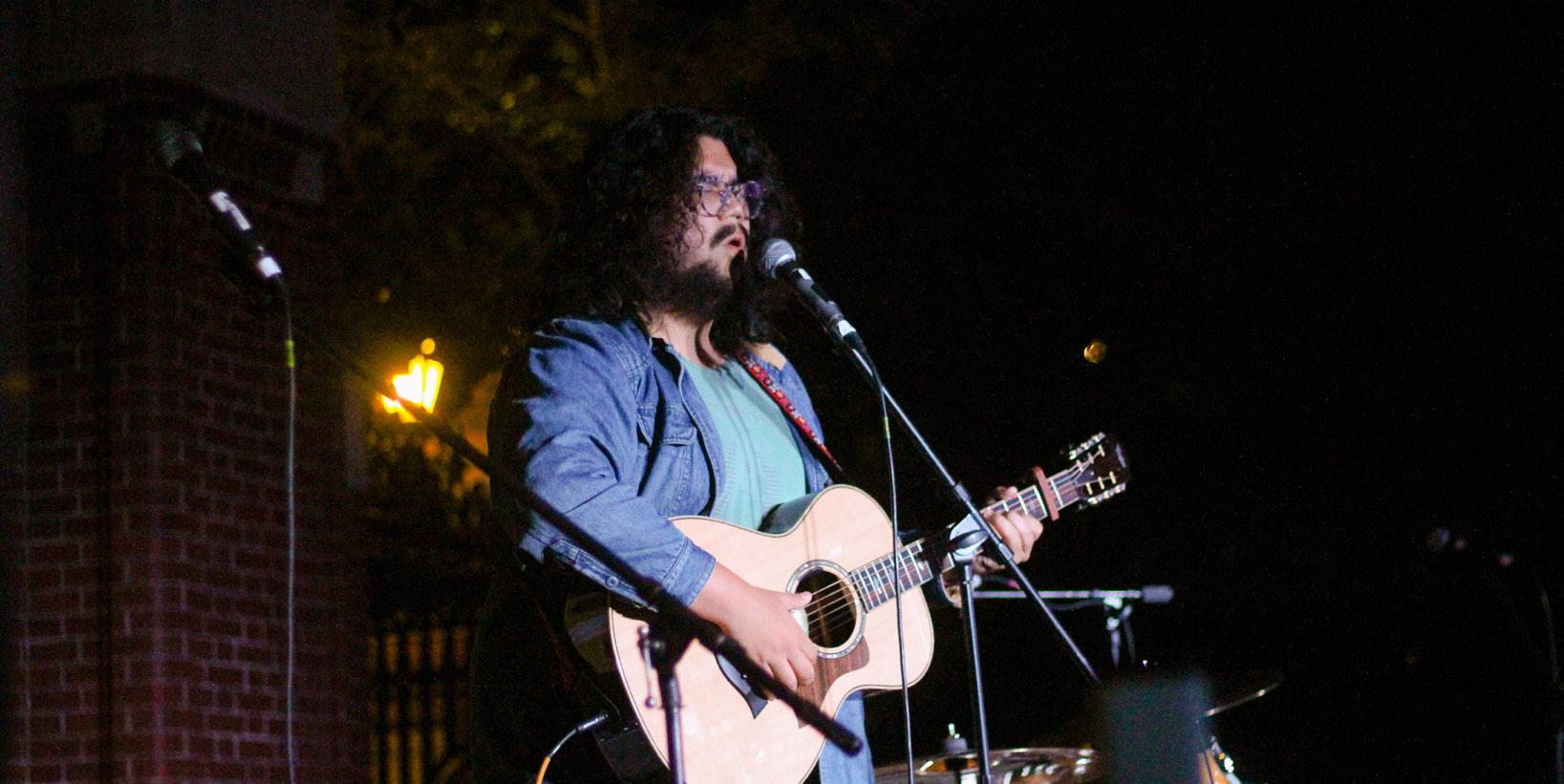
Chance Emerson ’23.5, a computer science and archeology concentrator, started college thinking music was simply his favorite pastime. Now, as he prepares to graduate, he sees it as a viable career.
“Through both the people I met and the things I got to do with them, Brown gave me a launching pad to make music an achievable future,” Emerson said.
Emerson recalled having never played a live show before beginning college. This year, he was able to go on a regional tour playing for hundreds of people a night with his established band, Blues Traveler.
“My close friend, bandmate and often co-writer and co-producer Jack Riley, … I remember the two of us sitting in Andrews common room in December of 2019 fiddling with a song, trying to get the tampering to sit right and having it come out in January,” Emerson recalled. “That song now has close to two million listens. … Seeing all of us get a lot better and do things we never thought we would do is awesome.”
Jack Riley ’23, a computer science and music concentrator, stated that his journey with music began in high school and continued at Brown. This passion eventually came to define his college life, he said, especially when he began seriously producing music remotely during his sophomore year.
“I’ve met most of my closest friends through bands and music classes. I spend all of my free time producing for many artists on campus and it’s most of what I think about all day,” Riley said. “I couldn’t imagine my Brown experience without the wonderful live music scene here and the awesome people who make it up.”
Performing with Blues Traveler was a highlight of Riley’s college experience. After about 50 shows, he noted the unique challenges of playing with several close friends in a stressful, live situation.
Emerson and Riley also reflected on some of their fondest moments creating music with the band these past few years.
“Honestly, one of my favorite highlights was (in) my first year during March, when we played a rock show in Andrews Commons,” Emerson recalled. “That was a defining moment for me and my bandmates.”
“I especially enjoyed getting to tour as sup-
made thinking that I was really a musician,” Emerson said. “It was the first time I felt like I wasn’t doing something just as a hobby, but I was doing it at a professional level.”
Emerson noted that this album — headlined by his single “House We Share,” which was re-
port for Blues Traveler in the fall of 2022, when we drove around the Midwest in a minivan, spending eight to 10 hours a day with each other. We got a good chance to connect,” Riley said.
Emerson shared some insights on his personal music-making process, stating that everything tends to be rather spontaneous for him. “I’ll get these musical ideas or melodies that just pop into my head, and then I’ll record them into my phone and then I’ll listen to them and work on them over the course of the day,” he said.
Riley, reflecting on the steps he takes to produce music, said he believes that a good song can be beautifully produced in several ways, and the direction it ends up going is often dictated by the sound of the writer.
“I often like to make things ‘wrong’ in some way, maybe being messy with a guitar line or ‘violating space’ with a hard reverb cut,” Riley said. “I feel like screwing up and being open-minded is a nice way to innovate in music production; even if I don’t get the sound I want, it might lead me to a whole new interpretation of the song.”
Both artists have plans to continue making music after graduation, taking their skills and their love for music to a higher level. Emerson recently completed a 10-song album called “Ginkgo” which he produced over the past two years.
“It was a very challenging record to write and make because it was the first record I feel like I
LILLY NGUYEN / HERALDleased in October and recently hit one million streams — was the first professional body of work that allowed him to be involved in the music industry.
“I started working with management in Nashville, Tenn., and I think I’ll be down there when I graduate, so I’ll be doing this kind of folk-rock, pop-rock singer-songwriter thing,” Emerson said.
Riley is planning on doing freelance music production after graduation, a continuation of his work over the last few years meeting new artists and making songs.
“I feel like I’m just getting started — there’s a lot more that I want to do, and Brown has taught me that I can make that happen,” Riley said.
Riley expressed gratitude toward all of the musicians who have trusted him to work on their songs, as well as his friends and family for their enthusiasm and support. Emerson, meanwhile, thanked both his peers and his fellow bandmates at Brown who encouraged him to continue on his musical path.
The experience of touring while working as a full-time student will stick with Emerson even after leaving College Hill.
“It’s crazy that five STEM majors, in their junior year spring and senior year fall, were able to do 36 shows for around 13,000 people, all while finishing our computer science homework backstage,” Emerson joked. “It was a memorable time.”
Two members of Blues Traveler share their most memorable moments
For over 50 years, the Open Curriculum has allowed students to pursue a variety of academic interests before narrowing in on a field they are ultimately most passionate about.
But over the past 10 years, the University has seen a dramatic increase in the number of students concentrating in areas of study most transferable to the workforce.
Since 2013, students have increasingly shifted to what many students described as more career-oriented areas of study — such as computer science, economics and applied mathematics. At the same time, some of the more classically liberal arts concentrations, such as comparative literature or archeology, have seen dwindling numbers of concentrators, according to data from the Office of Institutional Research dating back to 2013.
Students have increasingly flocked toward concentrations that directly translate into a job post graduation at universities and colleges all over the country, even at liberal arts schools like Brown. The Herald spoke with several students and faculty about these concentration trends and the factors that could be influencing the size of each concentration.
According to CareerLAB Director Matthew Donato, shifts in concentration data from 2013 to 2022 can be attributed to the rise of pre-professionalism at the University.
“Students often approach the process of thinking about careers assuming that there should be a direct connection between concentration decisions and career path or pre-professional planning,” Donato said. “In our career counseling and peer career advising appointments, we share with students that there doesn’t have to be a direct connection between concentration and career.”
Donato explained that students often select their concentration based on its relationship to their intended career path, though “many students also pursue careers that are only somewhat or notat-all related to their area of study.”
“Career planning is a highly individualized activity and we advise students that their chosen concentration will support virtually any career path they choose to pursue,” he said. “Our
post-graduate data also bears this out — while some concentrations are more tightly linked to some career paths, like Econ to financial services careers for example, the reality is that students from every concentration are successful in pursuing jobs in a wide variety of fields.”
And after graduation, “many humanities concentrators also pursue careers in finance or consulting,” Donato added.
Jerry Lu ’25, a computer science and business economics concentrator, applied to Brown to study modern culture and media. He applied under the concentration because he found it “most interesting and perfectly fit for” his interests.
“But when freshman year came around, thinking about career prospects, I decided not to take any MCM classes at all,” he said. “As an international student, I think that job security is the most important thing because I’m here on limited time and it’s a priority for me to land a stable job that can pay me properly.”
Although Lu came into college “having never touched code in my life,” he pinpointed computer science and business economics as the perfect crossroads between two different concentrations with promising track records for job security.
“Keeping in mind the plentiful career opportunities — most of which are high-paying — associated with the computer science discipline, I decided to give it a shot,” Lu said. “I also decided on business econ because of the career opportunities associated with it as well.”
“Given that I’m not set on which discipline I want to focus on, I want to keep my options open and cast a wide net,” he added.
Computing and information technology careers have remained one of the most common careers of University graduates. Since 2015, the industry has been the second-largest employer of Brown alums that are five years out from graduation, according to the OIR.
“It’s also quite scary how much AI can do for conventional coding jobs,” Lu added. “I take comfort in knowing that I have some technical knowledge about the biggest players in tech these days, but am definitely curious about how this will affect job security among conventional (computer science) roles.”
For Michael Yeh ’23, concentrating in Applied Math-Economics was a “practical” decision that let him pursue his academic interests.
“I definitely wanted … a concentration that is a little bit more professional,” Yeh said. “I wanted to keep sharpening my analytical skills in order to apply for jobs,” he said.
At the same time, Yeh said he enjoyed the mix of quantitative and qualitative methods that his concentration allowed him to practice.
Akshay Mehta ’26 is concentrating in earth, environmental and planetary sciences at the University. Since 2013, the number of EEPS concentrators has remained relatively steady. Although there have not been statistically significant changes in the number of students concentrating in EEPS, the field remains one of the smallest populated fields of study at the University.
For Mehta, choosing to focus on an EEPS degree was an easy choice — one made out of passion.
“I’m concentrating in EEPS with the intention of doing research in the field of meteorology, specifically,” he said. “My interest in (the field) comes both from a place of childhood passion, as well as desire to advocate for green solutions to atmospheric damaging problems.”
Donato told The Herald that one of the key elements of professional success the CareerLAB hopes to instill in students is the prioritization of “transferable skills” — skills used across unrelated fields that can bridge the gap between passion and practicality.
“While you’re here, we want you to explore pathways that will help you develop a skill,” he said. “Maybe it aligns with something that you’re studying in your concentration, or just something that you personally find rewarding or interesting.”
“For students who feel like they shouldn’t apply for a job in an industry because they concentrated in something completely different than what that job does, we always talk with these students about transferable skills,” Donato said. “All of the things that you’ve done are going to help you develop skills and be part of the story that you tell about your candidacy for anything.”
In warm weather, Brown’s quads are known as gathering places for students to throw a frisbee or quietly read a book. But all year round, the University’s outdoor spaces also host different types of gatherings: protests.
The University has a deep history of student-led activism, and the class of 2023 is no exception to this tradition. Over the past four years, the class has advocated for issues including increasing the University’s voluntary payments to Providence, maintaining test-optional admissions and divesting the endowment from fossil fuels.
Over the past four years, the focus of the activism has changed, but the passion of the activists has remained steadfast. Even with the disruption caused by the COVID-19 pandemic, student organizers have been a near-constant presence on and off campus.
The past half decade provides storied insight into the culture of activism at Brown and how it has been impacted by the graduating class.
Much like the first-year classes that came before them, the class of 2023 arrived on campus wideeyed and eager to get involved in the bustling campus community, activists told The Herald.
Despite knowing she wanted to enter the activist sphere even before arriving, Carina Sandoval ’23 was struck by the number of student organizations she had the option of joining. “I realized that activism meant so much more than my original conception of it,” she said.
She and fellow student Zoë Fuad ’23.5 were two students who joined the newly-founded organization Students for Educational Equity, which focuses on improving education equity at Brown and in the broader Providence community.
At the beginning, the student organization “felt very, very disconnected,” Sandoval said. But through SEE she learned “how one effectively organizes and mobilizes the student body.”
While SEE worked to understand its role in the activist community on campus, other student activist groups such as the local chapter of Sunrise, a national youth-led coalition advocating for legislative action to stop climate change, had fully-fledged campaigns underway.
In September 2019, a group of Sunrise activists protested at the office of Sen. Sheldon Whitehouse, D-R.I., for over five hours to encourage him to sign onto the Green New Deal, a legislative resolution to restructure the American economy in order to encourage clean energy use and reduce inequality.
Two weeks later, the organization held a rally for the Green New Deal attended by more than 1,000 students, The Herald reported. In the following days, the Sunrise Rhode Island chapter split into two separate entities: the Brown/Rhode Island School of Design chapter and the Providence chapter. Organizers cited long-standing concerns about University activists’ role in Providence as a reason for the split.
Despite the split, climate activism remained prevalent among student organizers. In fall 2019, The Herald’s semesterly poll revealed that the top issue on the mind of student voters was climate change.
Sunrise climate activism escalated in December 2019 when 14 of its members, including at least 10 University students, were arrested and later released for staging a sit-in at the rotunda of the Rhode Island State House. This followed a rally where over 600 activists, some of whom attended Brown, marched through downtown Providence demanding action to combat climate change and for then-Gov. Gina Raimondo to sign a pledge not to accept money from people and companies associated with the fossil fuel industry.
Climate activism continued into the new year, with a group of protestors at one point interrupting a speech by former R.I. Speaker of the House Nicholas Mattiello, D-Cranston. Still, activism aimed at encouraging the University to divest its endowment from fossil fuel entities was relatively quiet in 2019 compared to peer institutions, The Herald reported.
In March 2020, the University decided to sell its direct investments and managed funds that focus on fossil fuels. But this divestment was motivated by “escalating uncertainty” in the economic future of fossil fuels, one member of the Investment Office told The Herald at the time — not by student activism.
And climate change was not the only cause for protest on campus at the time.
In October 2019, during the University’s annual Family Weekend, protestors demanded that the University cut ties with Warren Kanders ’79 P’23, owner of the Safariland Group — a company that, at the time, was selling tear gas used by law enforcement at the U.S.-Mexico border. In June 2020, the company announced it would divest from tear gas, though The Intercept reported in 2022 that Kanders maintained ties to the manufacturing of crowd control products.
In March 2019 — before the class of 2023 arrived on campus — a referendum was passed by the student body to “divest all stocks, funds, endowment and other monetary instruments from compa-
nies complicit in human rights abuses in Palestine.”
A year later, the Advisory Committee on Corporate Responsibility in Investment Policies recommended that the University divest from “any company that profits from the Israeli occupation of Palestinian land.” Subsequent action has not been taken by administration.
Two days after ACCRIP’s recommendation was released, on March 13, the University canceled classes for two weeks and moved the remainder of the semester online. The next day, the first positive COVID-19 case on campus was detected, and former Provost Richard Locke P’18 announced that all students had to vacate Brown-affiliated housing by March 17.
The pandemic was just beginning.
As COVID-19 continued to spread around the globe, students adapted to connect with each other virtually. Although in-person advocacy had slowed to a near halt, students began vigorously planning for their return to campus.
Sandoval credited the death of George Floyd and COVID-19 with “a much larger push for students to be socially responsible to the communities that they’re in.”
Fuad also cited the pandemic as a “pivot to focusing a lot more on our virtual and social media materials.”
Fuad and Sandoval worked together on SEE throughout the pandemic. The culmination of their work in fall 2020 led to a referendum proposed to the Undergraduate Council of Students that would ask students if the test-optional admission policy implemented during the pandemic should become permanent. According to Fuad, SEE believes that this would make the admissions process more equitable by allowing students to choose whether to submit standardized test scores.
The referendum, which appeared on UCS’s spring election ballot, passed in April 2021 with nearly 74% of voters supporting a permanent test-optional policy. UCS referendums are non-binding, though, so there was no change to policy.
Perhaps the most influential outcome of the pandemic was the creation of the Student Activist Coalition, Sandoval said. Originally formed on Zoom, the coalition sought to bring together various student advocacy groups with similar objectives to better communicate and collaborate on their organization efforts, according to Fuad.
“You can’t necessarily build from the ground up,” Sandoval said. “You need to build upon existing networks.”
In fall 2020, with the 2020 presidential election on the horizon, a variety of activist groups became engaged in political activism.
Brown/RISD Sunrise partook in phone banking to support progressive candidates up for election. Grasping at the Root, an abolitionist coalition at Brown, called for the abolishment of the Department of Public Safety as well as increased effort to combat white supremacy on campus.
Students for Justice in Palestine continued to
put pressure on the Corporation — the University’s highest governing body — to divest from companies they claimed were profiting off of “human rights abuses” in Palestine.
Meanwhile, activism concerning sexual assault on campus resulted in protest and advocacy both in-person and virtually. After experiencing sexual assault during her first year, Ha-Jung Kim ’23 was inspired to found End Sexual Violence, a student organization that aims to “prevent sexual violence … and support those students who do experience this violence,” she said.
In April 2021, ESV hung approximately 2,000 posters around campus calling for the University to improve efforts to combat sexual violence. The posters read “Dear survivors, we hear you” and “End the silence, end the violence.”
“Planning around public health and Brown guidelines were difficult, and we tried to abide by them as much as possible,” Kim said. “The actual timeline was not severely impacted by COVID-19, but the ways in which we delivered our activism was.”
The following summer, organizers continued to plan their campaigns and a return to in-person instruction — and activism — that fall.
Upon a return to a campus with less restrictive public health measures in fall 2021, activism began its resurgence with a leading charge from SEE.
The organization launched a campaign to end consideration of legacy status in admissions in October 2021. The following month, Fuad organized a town hall to discuss this consideration with Dean of Admission Logan Powell. During the meeting, Powell cited a 25% decrease in legacy student enrollment over the past half decade.
He also dismissed the idea that legacy applicants are advantaged over other groups — such as first-generation and racial minorities — in the University’s admissions process.
That fall, Fuad, alongside the Office of Admission, “set up the first-ever student committee to start really discussing how student voices can be centered in the admission process.”
In fall 2021, rumblings also began among activist groups for a “University accountability campaign,” Sandoval said.
The goal of this campaign was to “redistribute Brown’s funds to the Providence community,” Sandoval said, aiming to increase pressure on the University’s responsibility to the surrounding community.
Around the same time, a small cohort of undergraduates kickstarted Students Against Koch Influence.
In December 2021, a proposal was brought forth for the creation of a Center for Philosophy, Politics and Economics, which would absorb the Political Theory Project. Students and faculty expressed concern that this center would accept donations from the Koch Foundation, similar to a grant accepted by the Political Theory Project in 2016. The Koch Foundation is run by billionaire and conservative political mega-donor Charles Koch, who has a long record
of denying the existence of climate change.
For Ethan Drake ’24, an organizer of SAKI, this called for reform “of the ethics policies of what a university should accept,” he said.
In March 2022, the Advisory Committee on University Resources Management recommended that the University revise its gifts and grants review policy to disassociate from businesses that perpetuate climate denial or disinformation.
“ACURM is an advisory body to the president,” Brian Clark, University spokesperson, wrote in an email to The Herald. The committee “is responsible for considering how the investment and expenditure of Brown’s financial resources are conducted in alignment with ethical and moral standards consistent with the University’s mission and values.”
Paxson announced in April 2022 that the University would adopt this policy in its review processes. The following month, faculty voted to establish the PPE Center.
While these discussions were underway, SEE and other student groups continued to organize their accountability campaign. Beginning in March 2022, the groups hosted an event in which they discussed Brown’s voluntary payments to Providence in lieu of property taxes. All of the University’s institutional properties are tax exempt, but Brown contributes to the city’s coffers through independent agreements, one of which is set to expire this year.
In 2022, Brown paid the city about $4 million in voluntary contributions. If it were to be subject to property taxes, the University would pay approximately $50 million to the city, according to a report by the Providence City Council’s Committee on Finance.
Sandoval called for increased payments by the University during SEE’s March event. A year later in April 2023, SEE and other student groups continued to call for the University to pay the city at least $15 million in voluntary payments — a cause that has rallied many students on the Main Green.
With new negotiations with the city underway, Clark previously highlighted in an email to The Herald that there are “many models across the nation for agreements between cities and universities.”
“We believe the City of Providence and Brown could benefit from an agreement in which our interests are more aligned and where we bring not only our financial resources, but our intellectual resources as well,” he wrote.
“We look forward to continued conversations with the mayor’s team in the weeks ahead,” he added.
But this accountability campaign is not the only initiative igniting students’ passion. The College Hill chapter of Sunrise was re-launched in fall 2022 — this time under the name Sunrise Brown — following its dissolution in fall 2020.
Isabella Garo ’24 was one of the founders of this new iteration. The idea was proposed by Gregory Hitch PhD’22, who previously taught a class on environmental equity, in spring 2022. Garo expressed interest but “by the time summer break ended and we were back on campus for the fall, there were three of us (still interested after) the summer,” Garo said.
“But then something crazy happened,” Garo
said. “At the beginning of last semester, we found out ExxonMobil would be recruiting on campus, and we said that we should protest that.”
Approximately 60 students interrupted an Exxon recruiting event to highlight the company’s lack of action in the climate crisis.
Garo credits this resurgence to the class of 2026. “It was really refreshing to see new students fresh off of high school … still so energetic and excited about doing this work,” she said.
Since then, the organization has launched a new campaign asking Brown to divest from fossil fuels and invest more in Rhode Island, which launched with a Main Green rally.
The Department of Computer Science’s teaching assistants also took to the Main Green to request a voluntary recognition of a TA union. The Teaching Assistant Labor Organization formed in December 2022 in response to difficult working conditions.
A week later, the University denied voluntary recognition of the union.
In March 2023, TALO held a workplace election with the National Labor Relations Board in which 91.5% of votes cast favored union formation. This decision marked the creation of the first undergraduate labor union on campus.
Students for Justice in Palestine has also recently continued their efforts demanding that “the University divests from companies profiting from human rights abuses in Palestine,” according to an SJP press release. A prominent protest at the February 2023 corporation meeting and rally in March brought this issue back to the forefront of students’ attention.
In a March 2021 letter to ACURM, Paxson wrote that “Brown’s endowment should not be used as an instrument to take sides on contested geopolitical issues over which thoughtful and intelligent members of the Brown community vehemently disagree.” Clark said that this stance has not changed.
Perhaps the most notable outcome of the seniors’ last semester was the revival of the Activist Coalition after a period of inactivity during the COVID-19 pandemic and the return to campus. Over a dozen on-campus activist groups — including SEE, Sunrise Brown and SJP — have joined the coalition.
“Even though we all have different campaigns that we’re running … being in communication with each other has been really helpful,” Sandoval said.
And for each of the graduating activists, their work seeking social change will not be left behind.
“I will take these experiences with me as I move forward to this next stage of my life,” Fuad said. “Being in this space has definitely affirmed for me that I want to be involved in organizing in some capacity for the rest of my life.”
Although she has experienced burnout with anti-sexual violence advocacy, Kim hopes to “eventually pick this work back up in other settings and even help students at Brown mobilize in the future.”
“I think that the activist space and the activist community on campus has taught me more than ever,” Sandoval said. “That community really is the core of what makes Brown good and what makes the human experience special.”
Annie Cimack ’23 called her sophomore year living arrangements “a gilded cage.”
Yes, she had a view of the Rhode Island Capitol, a king-sized bed and a private bathroom. But, she noted, she was separated from most of her peers as a resident of the Omni Hotel.
“I remember sitting in the hotel room in the Omni and thinking … I’m back at college,” Cimack told The Herald.
Cimack was one of hundreds of Brown students who were thrust into unorthodox housing situations amid the COVID-19 pandemic. In order to accommodate more students returning to a “de-densified” campus in spring 2021, Brown leased multiple off-campus residences.
The spring 2021 housing lottery gave lower priority to sophomores, meaning many members of the class of 2023 could not live in dorms, instead being assigned to buildings including River House — an apartment complex in the Jewelry District that the University later acquired — and the Omni Hotel in downtown Providence.
But students who lived in hotel rooms and apartment buildings say they were able to form close friendships and lasting memories despite their isolation and detachment from College Hill.
The University started to consider leasing additional housing in the late summer and early fall of 2020, explained University Spokesperson Brian Clark in an email to The Herald.
Brown had committed to a “de-densified” campus, in which every student would have their own room to accommodate Zoom classes and limit the spread of COVID-19. Consistent with this goal, the University adopted a three-term
academic calendar in academic year 2020-21, in which all students would be guaranteed two terms in Providence, The Herald previously reported.
In July 2020, the University announced it would lease four off-campus apartment buildings to house some juniors and seniors, The Herald previously reported. For the entire academic year, the University leased “around 220 beds” in various locations, according to Clark.
“The focus at all times was how we could best protect the health of our students, employees and Providence residents while delivering Brown’s world-class education,” Clark wrote.
After keeping COVID-19 cases relatively low in fall 2020, the University announced it would welcome all students back to Providence the following semester.
The goal was to bring “back as many students as we could safely accommodate from among those who wished to study in person in the spring (of) 2021 while continuing the de-densified approach to housing that we’d employed in the fall 2020 term,” Clark wrote.
In spring 2021, out of the class of 2023, 4% lived in non-University leased off-campus housing or commuted, 23% joined remotely and 73% lived on campus or in University-leased housing, according to data provided by Clark. He noted that he could not provide specific data on how many students in the class of 2023 lived in leased housing.
For Bryce Jones ’23.5, living in the Omni initially seemed to be a “pleasant” experience. He joked that the experience was like the “Suite Life of Brown University,” referencing the popular Disney channel show. But his initial impression soon soured.
The first couple of weeks, while students were supposed to be isolating in order to limit the spread of the virus, security guards were “patrolling the halls” and would knock on doors “if they could (hear) people talking,” Jones said.
“It was not going to be as fun as we had expected,” he added. “It was not going to be a social experience. It was very deliberately the opposite of that.”
Jones was not alone in feeling lonely. “We lost a bit of community,” said Peyton Newman ’23, who lived in River House. “We still had our pods, and they would come down and hang out sometimes. But the community at large felt very detached.”
Students were instructed by the University to only socialize in small groups, or pods.
For Cimack, staying in contact with friends on campus was difficult “because of the added restrictions of the pods.” She said that she was often unsure whether friends in other pods were comfortable socializing together.
“I felt … like life was going on without me on campus,” she said.
Detachment from campus and social isolation fostered mental health issues for those living in leased housing, multiple students said.
“Everyone’s social skills were definitely damaged” during the pandemic, Jones said. He added that he spent most of his time “totally isolated” and his social skills were “decimated.”
He described one of his friend’s morning routine in which they would “wake up and just cry for a little bit.”
“The underclassmen years are such a great time to meet people … and gain a better understanding of yourself through the interactions you have with other people,” Jones explained. Due to the isolation during this formative period, he believes it made “people really cynical toward
Brown.”
Students even found themselves missing Brown’s often-critiqued dining hall food. Residents of the Omni often only saw their peers while in line to pick up meals twice a day, according to Cimack.
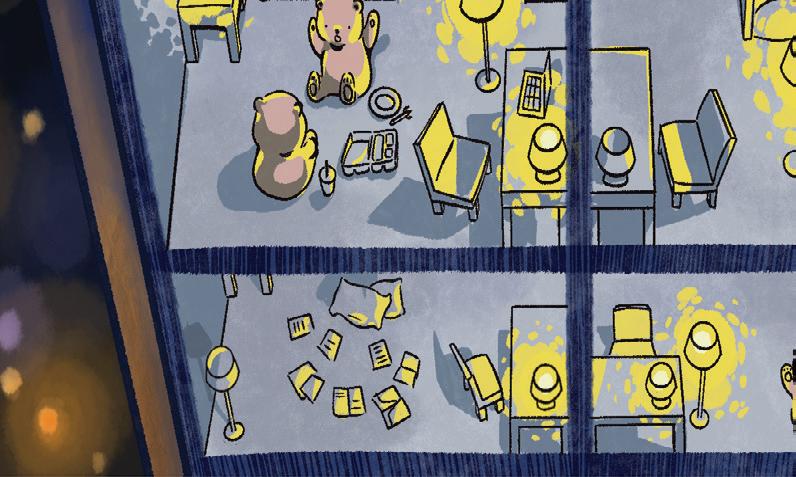
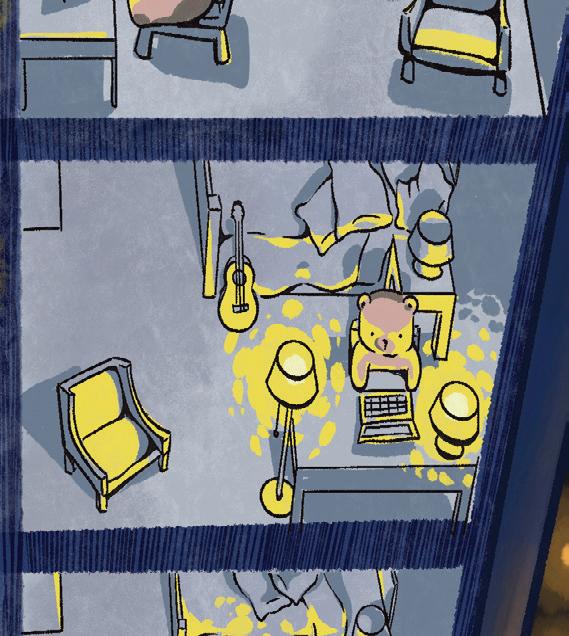
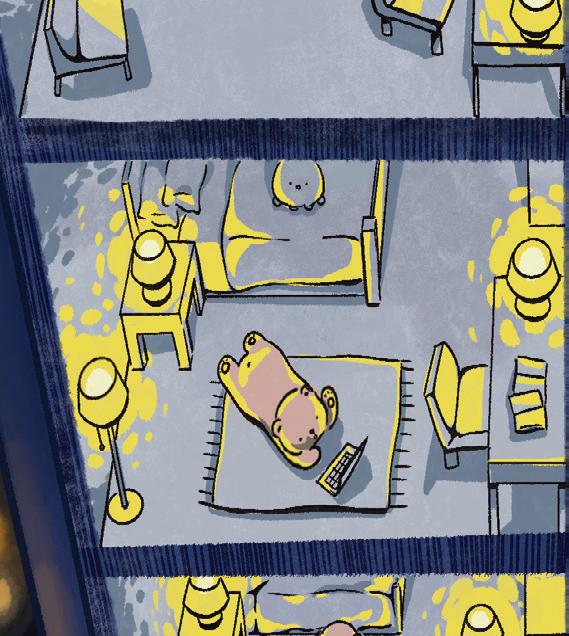

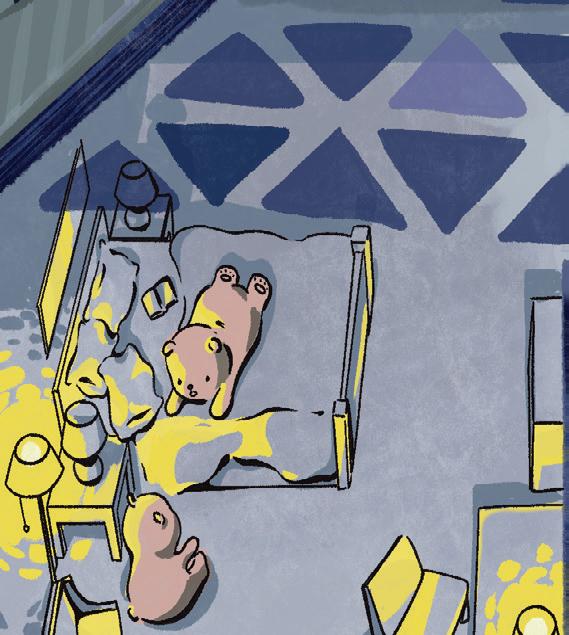
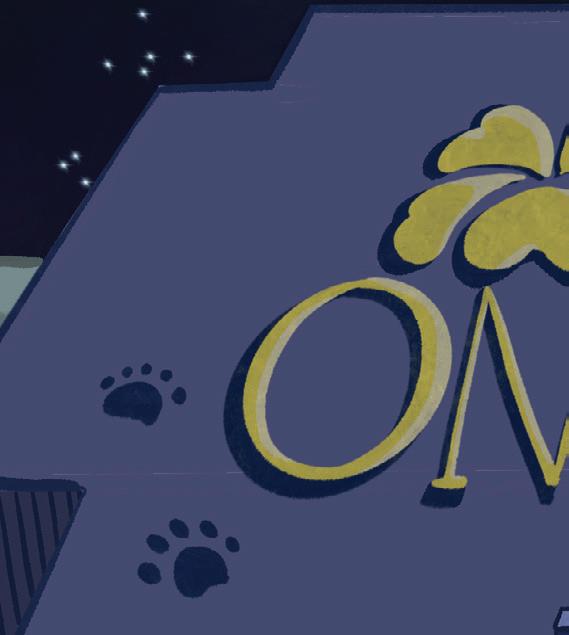
“Getting meals was a big deal that was kind of at the core of my social life,” Jones said, adding that he would often coordinate with friends to get food at the same time.
While the Omni had dining services set up on their premises, those living in River House had to commute to campus to pick up food, Newman said — about a one-mile walk uphill.
Despite the challenges, leased housing helped foster close relationships with immediate pod members and neighbors, residents said.
Cimack was not initially close to her neighbor in the Omni, but over the course of the semester they became “a pod of 2,” she said. “I would go over to hers and watch a movie,” she added. “She’d come over to mine and eat dinner.”
Specifically, Cimack recalled watching “Stanley Tucci: Searching for Italy” — a popular television series centered on the actor Tucci eating various Italian foods — with her neighbor. “If I didn’t have that connection within the Omni, it would have been such a different experience,” she said.
Newman recalled the strangeness of pivotal events during this time, particularly watching the results of the 2020 election, hosting her pod for Thanksgiving and celebrating her birthday in February.
Jones recalled how his pod would meet to watch movies and play chess during the spring 2021 semester. He had a room connected to one of his close friends, which was the site of many memories. “I remember listening to a whole lot of music … and forming a close friendship over a love of music with my pod-mates,” in addition to “watching people ice skate” from his win -
dow, he said. (The Omni overlooks the ice rink at Kennedy Plaza.)
Nevertheless, “the core of our social interactions was commenting on how strange … the whole situation was,” he said.
As restrictions were lifted, Newman remembered having “a bonfire on the rooftop of River House” with her friends and eating dinner.

“It’s a good testament to the fact that we did figure … out how to keep these social relations and how to keep friendships alive even though it was tough,” she added.



For those who lived in University-leased housing, returning to College Hill came with additional challenges.
“I felt like a freshman coming onto Brown’s campus as a junior,” Cimack said. “I felt like I missed a lot of my Brown experience. I felt like I was getting (a) late start.”
Newman described that — for her — the detachment of River House did not linger in the subsequent school year. Still, she noted that “there are some friends” who she was “not the most compatible (with) anymore” after a year apart.
The experience reminded some to make the most of their final two years before they walked out of Van Wickle Gates. “I definitely was very aware that I needed to soak it in while it was happening because … I was not gonna have as much time as people normally would,” Cimack said.
Despite the challenges that COVID presented, Cimack described feeling a sense of gratitude for her college experience. “‘I’ve loved my time at Brown,” she said. “I’ve made incredible friends, and had great courses and teachers”
“I think they did everything to the best of their ability,” she added. “It was an unfortunate situation, and they just tried to figure it out.”
Even her time in the Omni did not overshadow her Brown experience: “I appreciate even the opportunity to come on to campus in some regard during that weird time.”
Founded in 1764, Brown University has lived a life spanning several centuries.
As the seventh-oldest institution of higher education in the United States, the University has seen a world of war, peace, protest, technology and so much more. In 258 years, the University has managed to accumulate an eccentric history of superstitions and traditions — most of which directly pertain to the annual commencement ceremony at the end of each May.
The first commencement ceremony was held in 1769 and hasn’t remained the same since its birth. Over the years, Commencement has gone through many changes, from the time of year it’s held to the language used to write students’ names on their diplomas. Throughout changes to location and adjustments to graduate marches, students can rest assured that University superstitions will be the one consistency of Commencement.
With this year’s commencement ceremony quickly approaching, The Herald spoke with seniors and alumni about their experiences learning about — and believing in — the many quirks that make Brown the characteristically unorthodox institution it is today.
When Toby Arment ’23 walked through the Van Wickle Gates in 2019 during convocation his first-year, he was filled with pride. But when he walked through the same gates just three years later with the Brown Band for the annual commencement march, he was struck with shock. It might sound strange to non-Brunonians, but here on College Hill, legend has it that walking through the Van Wickle Gates twice before Commencement will curse students from graduating as planned.
“Usually, the band avoids the superstition by standing on one foot and hopping backwards as they pass through the gates so they do not ‘walk’ through them,” Arment
said.
Although Arment was a member of the band, he somehow didn’t get the “hopping” memo.
“I had been abroad all year and not closely connected to the band,” he explained. “So I was unfortunately not reminded of this ritual during the practice for Commencement but everyone else had been sometime before.”
“So as we approached the gates, everyone got on one foot and turned around, while I, dumbstruck, walked straight on through the gates,” Arment added.
Thankfully for Arment, he’s a non-believer.
Despite being initially off-put upon realizing he’d allegedly cursed himself, Arment explained that he now “wear(s) it as a badge of honor.”
“For a moment, I was like ‘oh darn,’” he said. “But I’m not superstitious and did not believe that I would face actual negative consequences. It’s like a mild embarrassment because I did the one thing you’re not supposed to do, … but I don’t know anyone who intensely believes in it.”
Arment said that while he doesn’t believe in the superstition of the Van Wickle Gates, he sees how the myth brings people together. The superstition itself has inspired the creation of traditions within the Brown community.
Even after walking through the gates twice, “I’m still going to graduate now,” Arment said. “But thanks to this silly belief, we have goofy band kids doing a little jig that only Brown students can understand the rationale for.”
For Noah Glickman ’23, the omen surrounding the gates themselves isn’t “real,” but the superstition on its own becomes “a self-fulfilling prophecy, emotionally.”
“With the Van Wickle Gates, the cultural truth is its specialness,” he said. “The gates are a material expression of success which, of course, can create problematic individually held beliefs about how success is defined.”
“It doesn’t really matter if it’s true or not on its own,” Glickman continued. “The fact that we have a cultural belief around it is a truth in itself. We make our own reality.”
Lili King ’22.5 graduated at the Midyear Completion Celebration in December. Because the ceremony happened on December 3 this past year — before the end of their last semester — King and the other 0.5ers who participated were made to walk through the Van Wickle Gates twice before being technically complete with their degrees.
“I walked through the gates twice in that sense,” King said. “But I would never walk through them twice any time before.”
“If they were open in the spring during finals for Commencement, I would absolutely refuse to go through them,” she explained. “Like, if I ended up walking through them and then had a final that was super hard or something, I definitely would think that I had been cursed in the middle of the test.”
The Pembroke Seal: Leaving Brown with a baby or a diploma
A 2009 Herald article explains the traditional superstition surrounding the Pembroke Seal: “A decades-old myth says that girls who walk over the Pembroke Seal, located on steps near Alumnae Hall, will become pregnant before they graduate, and that male students who tread over the Pembroke campus landmark won’t graduate at all.”
Glickman, who doesn’t have to worry about the prospect of getting pregnant, said that his attitude toward the Pembroke Seal is similar to the one he has regarding the Van Wickle Gates — except he feels that “the Pembroke Seal legend is incredibly sexist.”
This tradition “attempts to circumscribe success by pitting getting pregnant against having an academic career,” he said. “You can only be a ‘good’ student if you don’t get pregnant, by this measure. Just like you can only be a ‘good’ student if you walk on graduation, complete your degree and pay the University money for it.”
“These traditions are just ways of teaching us the University’s cultural values — women can’t be both good mothers and good students, a degree is the end-all be-all of academic success,” Glickman added.
For Carina Sandoval ’23, who is “a very superstitious person,” the mythic curse of the seal is enough to warrant a change in direction when strolling across north campus.
“When I lived on north campus, I would always jump over the seal if I accidently got too close,” she said. “I think that the Pembroke Seal tradition is obviously outdated, and when classmates or visitors would tell me that it was stupid, I agreed.”
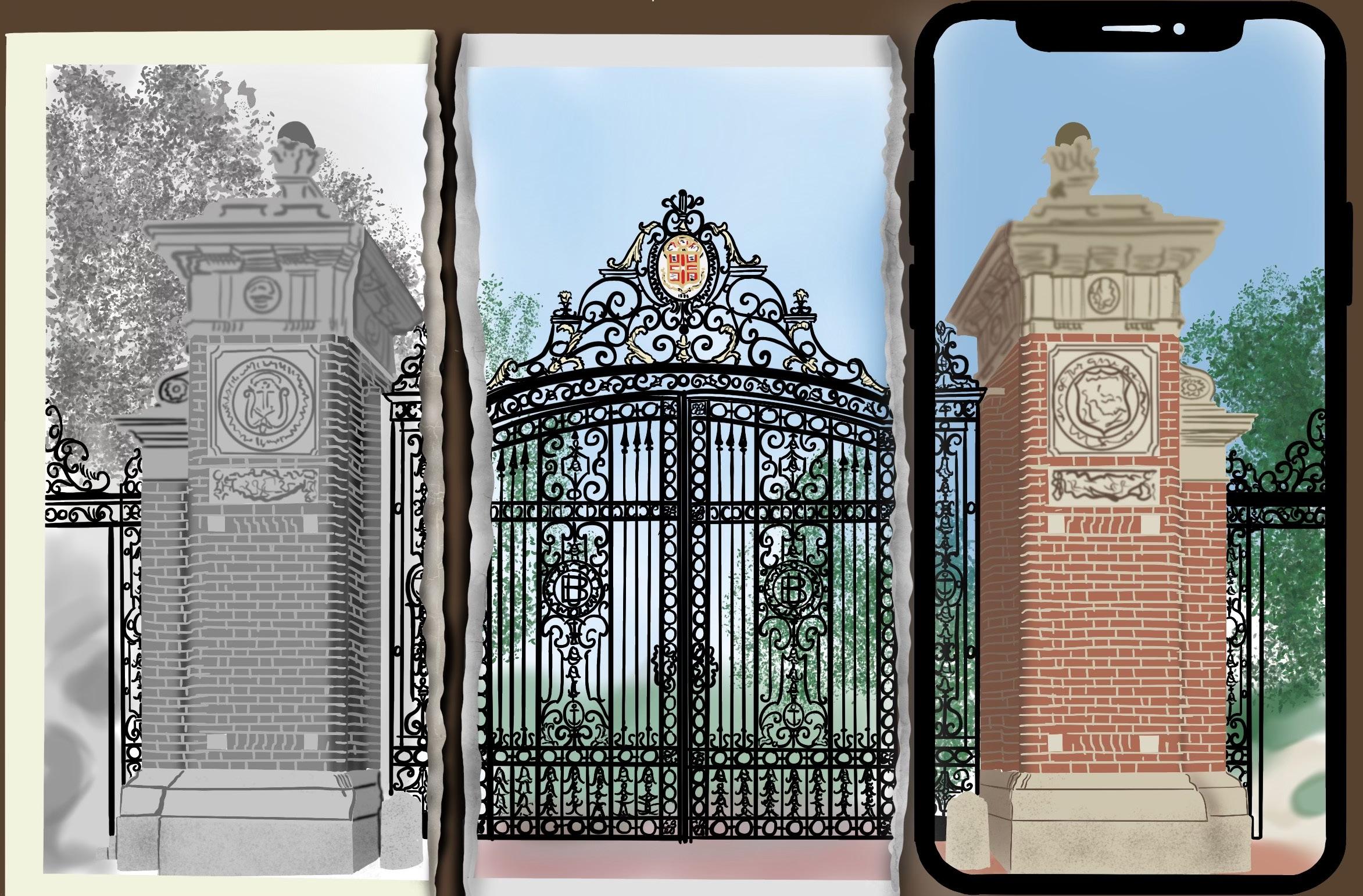
“But there was always the little sliver in my mind that was thinking about how I’m someone who is able to get pregnant and how I very much do not want that right now,” Sandoval explained. “So I stay away from it to this day.”
“I can interpret anything and everything as a sign or coincidence or an omen, so when there’s something already in place that has been passed down from students for years, I’d rather not risk it,” she added. “I stay away from the Van Wickle Gates and Pembroke Seal as much as possible because I know that I put so much effort into coming here that the thought of not graduating is terrifying.”
Ilyaas Sugal ’23 also avoids the seal to
“not jeopardize any chances of getting a degree.”
“I’m a first generation student, low-income and college is new to my family,” he said. “Nobody does college — just my older sister and I, so risking graduation was absolutely out of the question.”
Sugal first encountered the seal and its prospective power during his first-year winter. Just before finals season, a snowsquall hit Providence — a new condition for Sugal, who was born and raised in California.
“It was a snowstorm out of nowhere. It went from clear skies to heavy snow in minutes,” he said. “I’d never seen anything like it in my life, so as it’s snowing and raining, I decide to head home to my dorm in the middle of studying.”
Sugal gathered his things, loading notebooks and folders into his backpack, and waved goodbye to his friend before setting off to walk home from Smith-Buonanno Hall.
“As I’m walking, I’m heading in the direction of Sidney Frank,” he explained. “And it was so dark out that I completely forgot about the Pembroke Seal as a whole.”
“It’s snowing and raining hard and as soon as I take the third step where the seal is supposed to be, my brain processes that I’m not supposed to be stepping on that,” Sugal said. “So I hyperextended my leg to immedi-
ately skip that third step and step above it. I have long enough legs, but it was snowing and it was raining and that slush that was on the ground completely got me.”
“When the leg that was moving landed on the ground, it skidded,” Sugal laughed. “I damn near did the splits over the Pembroke Seal. I didn’t step on it because I flung my body over it — I literally flipped, landed on the ground on the other side of the stairs, and laid there on the cold, wet ground for five seconds wondering, ‘Did that really just happen?’”
“Did I really almost break my back and pop my knee just to follow a thing that people said might impact my graduation? And the answer is absolutely yes,” he said. “Me and the Pembroke Seal? We don’t vibe like that.”
Though each of the seniors The Herald spoke with told different stories, one unique commonality prevailed among all of them. The culture established by these curious University traditions and superstitions is enough for them to play along, whether with enthusiastic fervor or half-hearted indifference.
“I’m not a superstitious person,” Sugal said. “But there are some things where when enough people start to believe in a superstition, you also sort of start to believe in it.”
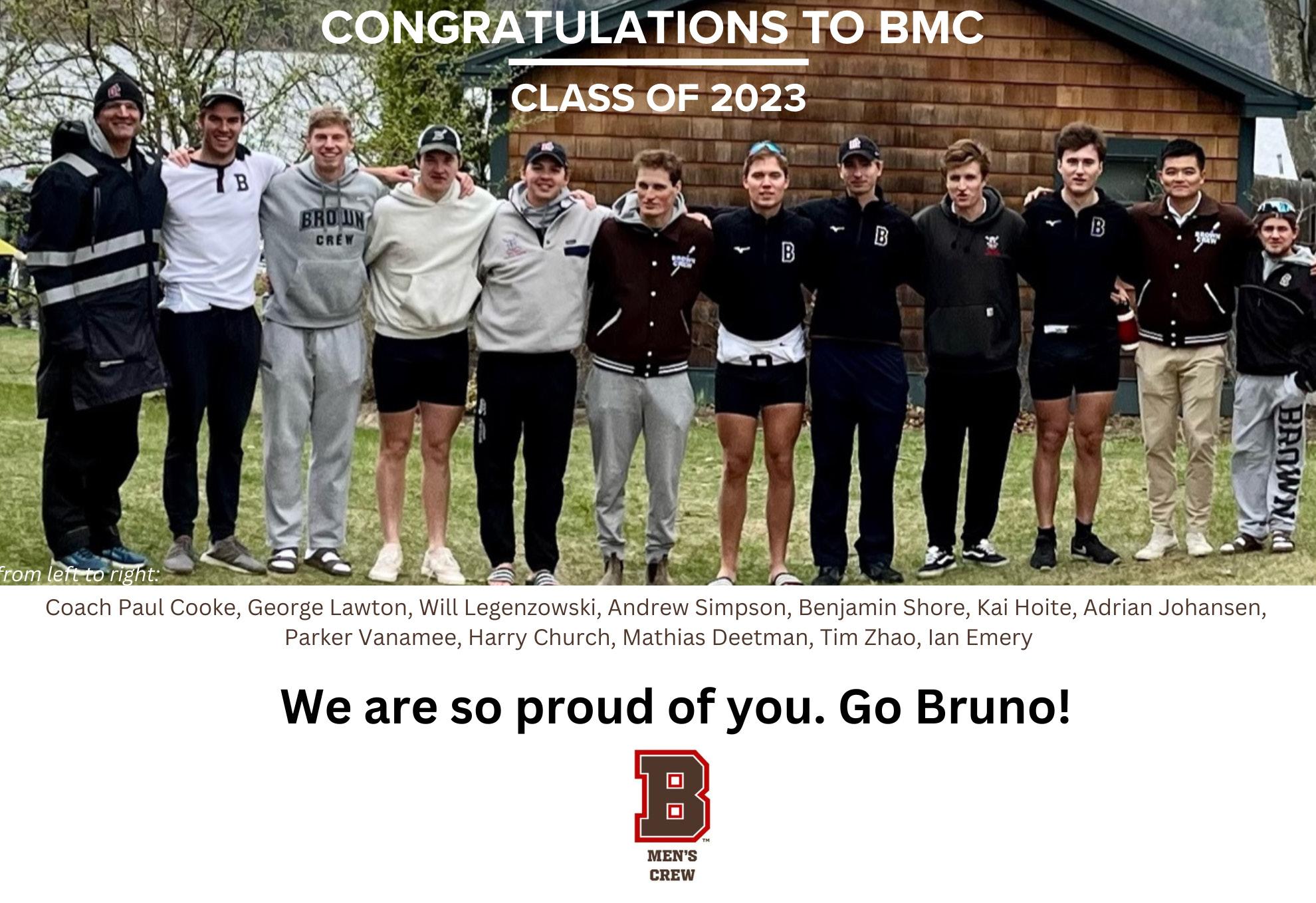


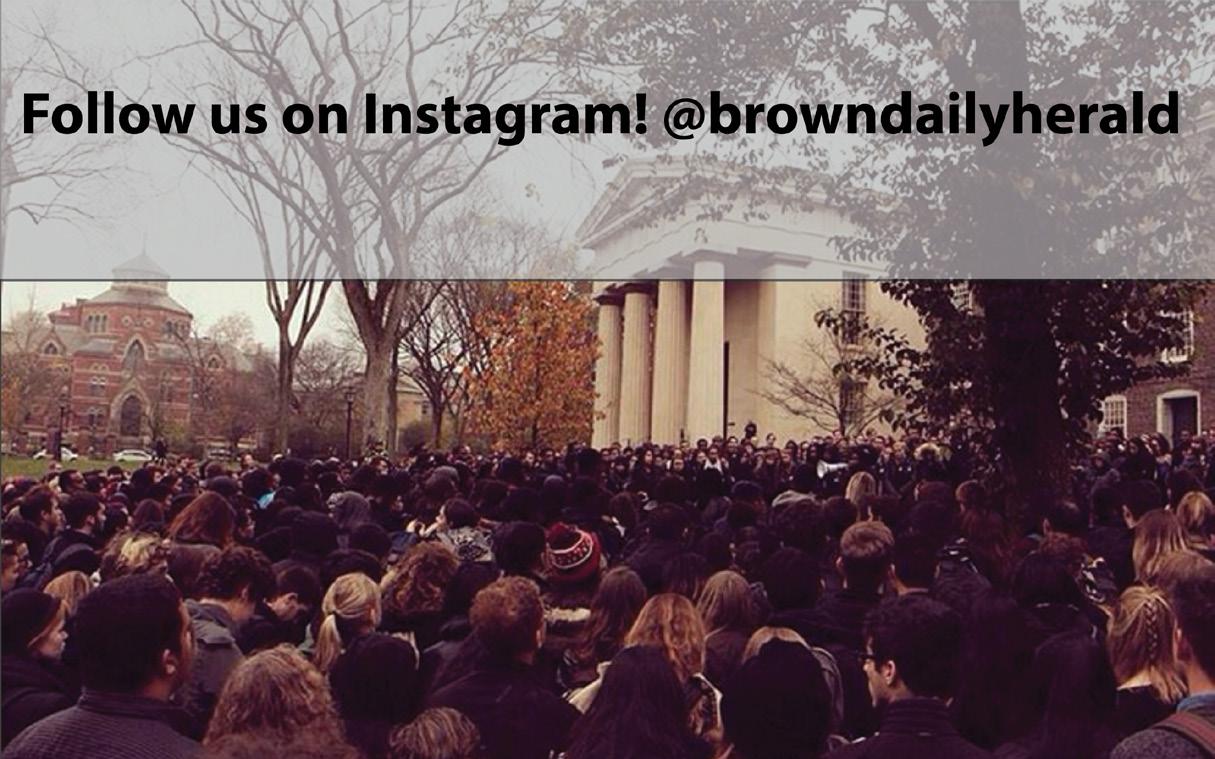
Ma
Wednesday
For

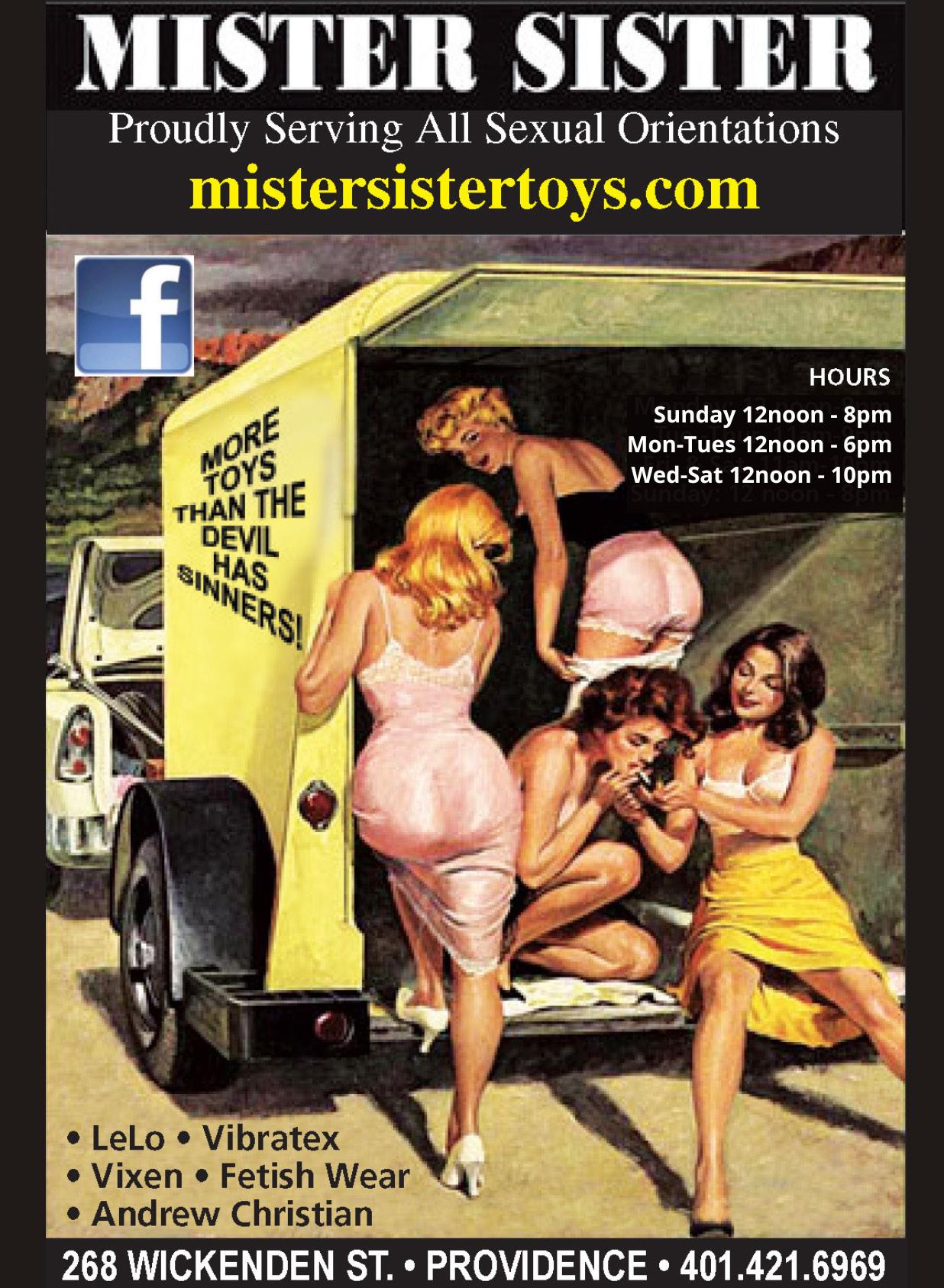
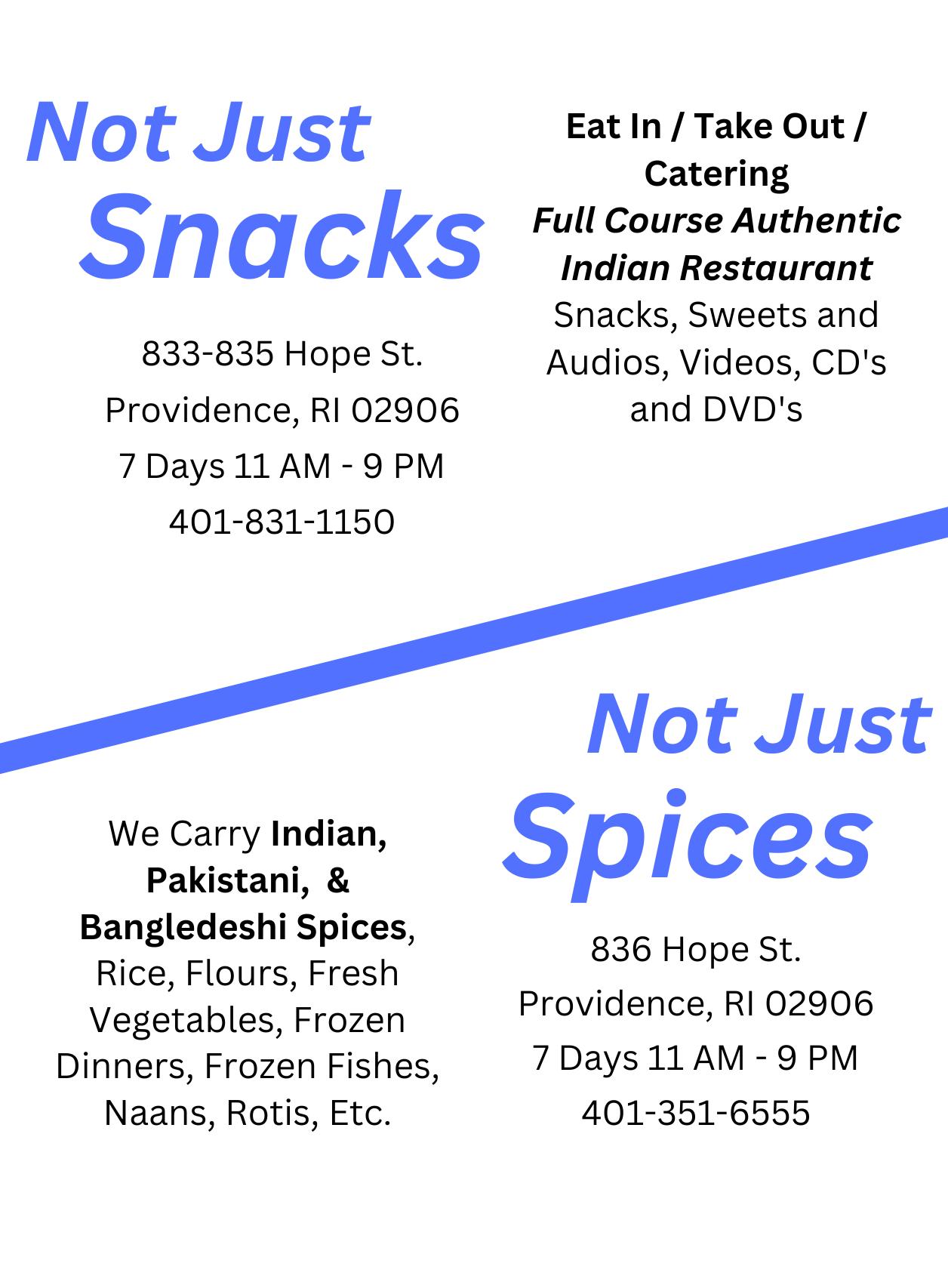



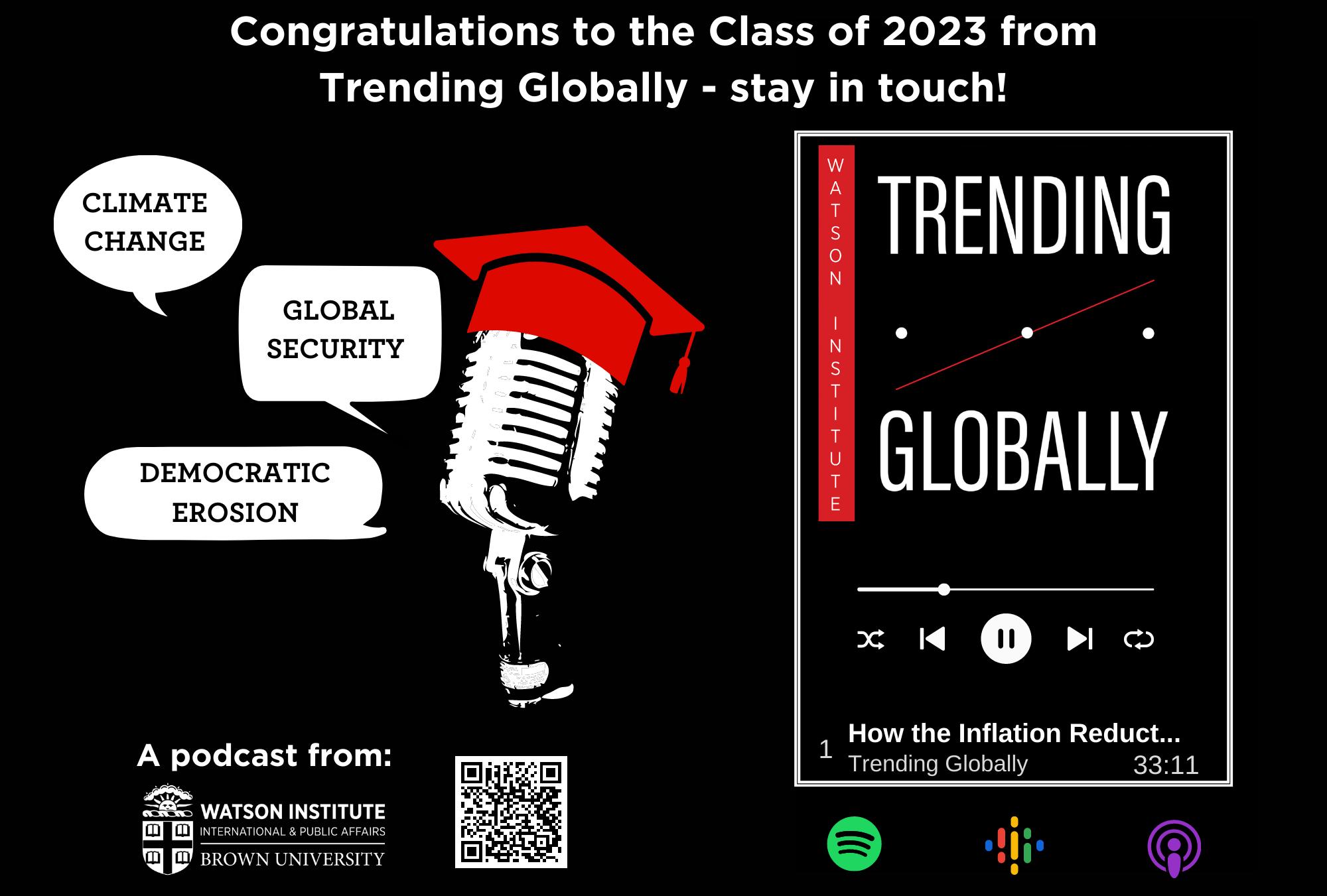


I still remember the day when that column got published. My new friends and I squished together on the suspiciously stained couches of the Emery-Woolley lounge while we cracked open our copies of the newspaper.
“That book was so boring.”
“Yeah, it was stupid.”
“Nice column.”
ious I was.
The first column I ever wrote for The Herald was titled “I did not like the first-year reading.”
Perhaps you remember that book — “The Idiot” by Elif Batuman. The pink paperbavck Brown mailed us the summer before our first year, with the picture of a gray rock on the cover. Our first homework assignment. Perhaps you liked it. Perhaps, like me, you didn’t.
Nevermind that the book was a Pulitzer Prize finalist. The verdict was in: “The Idiot” sucked. Then we returned to our usual hijinks; I don’t remember exactly. Maybe a game of Bananagrams or never have I ever, our hands gripping Solo cups of the “wine” that one of us had brewed using grape juice and yeast in his dorm room.
Now, three and a half years later, I have some regrets about that column.
Mostly, I wish I had been kinder toward the work. Rereading my column puts me back in the skin of my firstyear self, and I remember how obnox-
I was fresh out of high school, where most stories had clear arcs and clear endings, whether a violent death (“Et tu, Brute?”) or a marriage to Mr. Darcy. To read a book that placed, at the center of its narrative, a warning about the incoherence of narrative — a book that ended with the line “I hadn’t learned anything at all” — was terrifying, confusing, disorienting.
But I hid those mixed feelings in my column, wrangling them into an easy thesis of dislike. I suspect I did this in order to deny “The Idiot” the power of its prophecy. If I convinced myself, as I did in my column, that I was “unlike the narrator” of “The Idiot,” I would not become her.
Selin, the protagonist of “The Idiot,” goes to Harvard after all (I did not get into Harvard). She chases a man (with more red flags than a Danish soccer match) across the Atlantic in

had a nicely wrapped message like the American coming-of-age films I grew up watching, the truth is that trying to find yourself is really hard.
also terrified.
the name of unrequited love (I would never). She obsesses over the meaning and meaninglessness of psycholinguistics and atomic particles and rocks (how pretentious).
I denied any potential parallels between myself and the narrator: How I was also attending a stuffy, old-money Ivy League school and felt unsure of what it meant to belong at such a place.
REN on page 24
College is the time to find yourself — at least that’s what movies tell us. But reality is not often like what we see on the silver screen. While I wish that my time on College Hill
During my first year, I did the classic freshman things. I shopped an unnecessary number of classes, signed up for half of the clubs the University offers, and went to the fully-packed ice cream social. I spent half of my time on Courses@Brown browsing courses for the next four years and proclaimed my dedication to different concentrations every time I introduced myself to a new face.
While I was embracing Brown’s ethos — exploring different fields and trying to find my true passion — I was
I remember the first summer — or winter for the US — back in my hometown of Maringa, Brazil, constantly feeling a strange disconnect with my friends and family when talking about my first semester. They had less enthusiasm for my exploration — instead, my myriad new interests seemed to worry them. When I asked one of my high school best friends about this, she said something like: “It wasn’t like you to pursue something like this.” Most echoed this, saying that my new interests felt out of character.
In part, I couldn’t blame them for being confused.
Before leaving for Brown, I talked
about how I was excited for philosophy classes, wanted to be a psychology concentrator and thought about continuing theater as an extracurricular. Now that I was home, I hated
GIMENES on page 23
Johnny“I revisited ‘The Idiot’ while working on this column and it astonishes me how resonant certain passages feel”
“Finding yourself is an ongoing process — one which is scary and challenging, but will be OK in the end.”
Where has the time gone? It’s as if I closed my eyes on my first night here at Brown and opened them on the morning of our graduation. When we said yes to Brown, we decided that this was the place to become young, independent scholars. We decided that we loved every blade of grass on the Main Green, muddied beneath the feet of frisbee fanatics. We decided that we would tolerate the muskiness of a Goddard basement party in exchange for laughter and the freedom of danc-
ing to Doja Cat’s “Kiss Me More” for the one millionth time. Though many associate Brown and our Open Curriculum with indecisiveness, we are actually expert decision makers. We know what it’s like to walk — utterly overwhelmed — onto the Main Green during the Fall Activities Fair. We know what it’s like to sign up for Shades of Brown, The Indy, CoRays, Students of Caribbean Ancestry, Impulse and twenty more new clubs. We also know what it’s like to finally whittle down to only five groups we’re doing graphic design for. Over the years we’ve spent on College Hill, we have made a lot of decisions. In a place as teeming with life and opportunity as Brown, we did the hard work of deciding what our paths were going to be. For some of us, that looked like choosing between panini pressed grilled cheese at Joe’s or pasta night at Andrews. For others, it looked like making a Google spreadsheet with every class we’ll take from now until we graduate. I, personally,
fell somewhere in between. I wasn’t creating giant spreadsheets and reading the University Bulletin from front to back, but I was bounding my way through Brown one curiosity and opportunity at a time.
Just as I had begun to find my path at Brown in the spring of 2020 — deciding to concentrate in Gender and Sexuality Studies, working as a graphic designer for the LGBTQ Center and joining SHAG, Brown’s sexual health awareness group, and XO Magazine — everything changed. On March 12, 2020 — my birthday — Brown gave us a week to evacuate campus. Gone were the days of me sitting in the front of a packed Sayles classroom, attending a “Philosophy of Sex” lecture by Professor Richard Heck, a class I had eagerly wormed my way into. Shocked and panicked, my friends and I called family and made travel arrangements. We made impossible decisions that young people should never have to make, the kind that we have had to continue to

I’ve learned many lessons both inside and outside of the classroom during college. But one of the most profound lessons changed my outlook on college, and on life — and it happened on an otherwise mundane day in 2020.
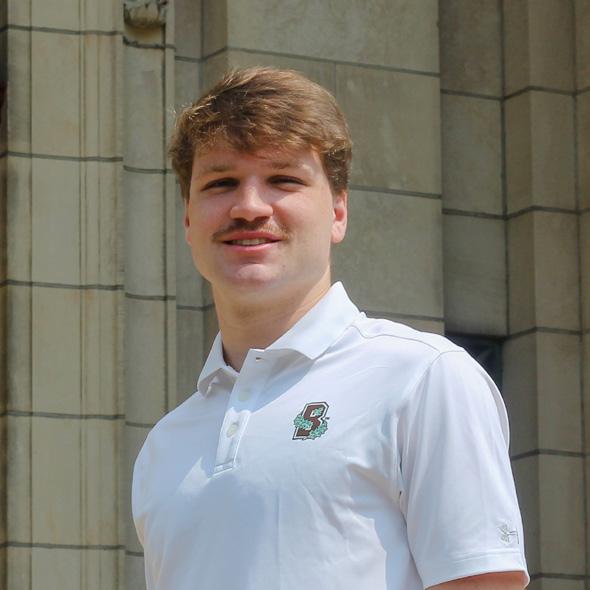
Growing up, my dad had been laid off from work more times than I could count, and while my mom dedicated her life to raising me and my four siblings, she did not bring in any income. As a result, we developed several side hustles to make ends meet, one of which
was scrapping old metal. One Saturday morning at the scrapyard, a few of the employees approached us to help weigh out the more valuable materials we had brought. They were speaking Spanish, and my dad, who hadn’t practiced Spanish since high school, decided to strike up a conversation. I was annoyed and embarrassed, as he was making a dismal weekend chore take longer than necessary. When I went to summon him back to the car, I saw my dad and the workers in jolly conversation, almost as if they were at a reunion reminiscing over old times.
On the ride back, I thought over the exchange my dad had spurred. I couldn’t have imagined a worse set of circumstances to strike up a conversation: We had been in a freezing scrapyard under a bleak winter sky, surrounded by loud machinery. But for some reason my dad had found cause for cheerful human interaction. In fact, he had better luck making friends in the scrapyard than I did during the icebreakers of my first year of college. This simple exchange
had brightened his day and the workers’, and it had transformed another run-ofthe-mill chore I would’ve likely soon forgotten into a vivid scene I could not stop replaying in my head.
Fast forward a few months, and I was surrounded by metal again. But this time it was not scrap metal; rather, it was the silver interior of the elevator at the Omni Hotel, where a few hundred of us were staying as sophomores. I’d just picked up my lunch that afternoon and walked through the foyer and into the elevator, watching the doors close behind me. I was waiting for the red number on the display to reach 15 so I could retreat back to my room and eat my lunch. Those days were monotonous: I’d wake up, attend class via Zoom, maybe work out, complete my homework, scroll on social media and fall asleep to TV after eating dinner. I felt like I was missing out on college. Sure, we were in the “unprecedented times,” but it almost felt like I had been living life more fully on that dismal morning at the scrapyard than I was at Brown, where I was sup-
make over the past four years.
As quite a few people know, I was diagnosed with stage four lymphoma on November 24, 2021. It was my dad’s birthday. While treatment for lymphoma looks different for everyone, I needed to complete six months of chemotherapy to live. Instead of returning from Thanksgiving break along with my friends, I got PET scans, a port, and my first round of chemo. At least I got out of some homework, right? The kicker of it all was that I
COLLINS on page 24
posed to be having the best four years of my life.
It was truly draining. I was letting life pass me by. The most exciting thing that would happen was errantly receiving a “[PLEASE READ] COVID-19 Test Required” email, which at least got my heart racing a little. But as I recalled that moment in the scrapyard, and my mix of shame and surprise, I remembered that it was the latter that had overtaken the former. If life was really passing me by, I didn’t have much to lose. I decided to follow my dad’s example.
BEDNARZ on page 25
“Even if catastrophic events in our lives obscure the future ahead of us, we still must make decisions.”
“We are humans, each offering stories of our lives, all of which have led us to this very moment.”
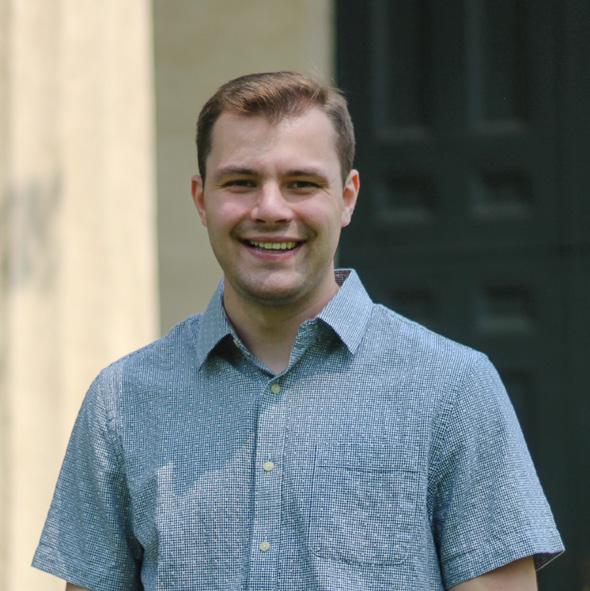
We each have an incredible responsibility to beat back against this trend. I have seen the importance of community, both before coming to Brown and during my time on College Hill. Without a commitment from each of us to forge strong relationships, we will be unable to build a better, happier and healthier world. For me, the importance of others’ support was apparent from a young age.
Thursday, I’d get dropped off at home by Tatum and Harris’s mom or dad. And on Friday, Aunt Shirley would pick me up, and dad would meet us at her house for dinner.
This was not an atypical week.
The day after he delivered the Noah Krieger ’93 Lecture on the future of American democracy here at Brown, Connecticut Sen. Chris Murphy published an Atlantic piece on the same topic. He wrote that “despite the nonstop information flow, more Americans report greater feelings of intense loneliness today than at any time before.” Similarly, Surgeon General of the United States Vivek Murthy said this month that we are encountering an “epidemic of loneliness and isolation.”
Jackson McGough ’23You have almost certainly heard the proverb, “It takes a village to raise a child.” When I was six, my mother died suddenly. In the years that followed, I came to understand these words well. My dad was the first community organizer I knew, and I was his first deputy.
I have memories of the two of us sitting at the kitchen table on any given Sunday night mapping out that week’s logistics. Aunt Pam would pick me up from YMCA aftercare on Monday. He’d pick up Tuesday to take me to soccer practice. On Wednesday, I’d go over to Deontay’s house where we’d play SpongeBob SquarePants Monopoly. On
Family was, of course, an important piece of the puzzle. But what was always remarkable to me, from the earliest moments after my mom’s death, were those who stepped in to help make my dad’s life easier, even near-strangers. From a young age, I was fortunate to see what a strong, supportive community looked like.
Imagine if you were asked what “community” at Brown looks like.
For me, there is one image that comes to mind before all the rest: the Main Green on a warm, sunny day.
Personally, I have never been able to do any school work when there are hundreds of people out and when frisbees, footballs and aerial dancers are flying overhead. But I have always found pure, unadulterated joy in seeing everyone out
and about — in having long conversations with friends in the shade of one of Brown’s massive trees or playing with a friend’s puppy as it rolls around in the grass.
Even on an ordinary, less sunny day, when the entirety of the student body is not actively procrastinating school work, walking across the green is an opportunity to wave at your first-year
RAUSCHENBACH on page 25
Freshman year — and especially that maiden semester — each of us had to blaze trails and enforce good habits. Many of us had never lived on our own or been without a nagging parent regulating our whereabouts on a Friday night. Luckily, in this uncertain and occasionally intimidating climate, a great number of us shared an imperative to meet people, create connections and make friends. Some found fast friends on our first nights out and at hopelessly awkward orientation events. So much emphasis was put on
making friends in the days following our march through the Van Wickle Gates, and it was easy — everyone was in the same boat, open to striking up a conversation.
But, over four years at Brown, keeping friends has proven much harder. Maintaining relationships requires effort and investment, and how actively we worked to stay in each other’s lives largely defined our college experience. It will also define how we remember it.
Think of the friend you met your first fall who you passed last week on the Main Green and didn’t greet. “That was awkward,” you may have thought to yourself. How did this once-close friend become someone you couldn’t even exchange pleasantries with, much less hang or go out with?
Chances are that neither of you reached out to check in after being sent home for COVID-19 or during that first in-person semester back on campus, not willing to invest the minimal effort to keep the relationship
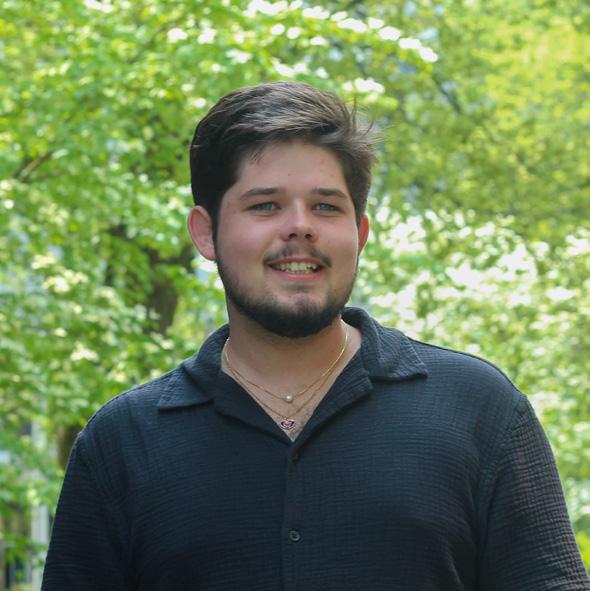
alive. Maybe that doesn’t weigh on you — after all, friendships come and go, and perhaps this person wasn’t destined to be a best friend anyway — but there’s probably a twinge of sadness there. Neither a friend nor a nameless member of the crowd, they are now forever somebody you used to know.
Whether it bothers you or not, this offers a good opportunity for reflection. Without a doubt, we all have good friends who drifted from us and relationships we didn’t keep. As we transition to the next era of our lives, it is a good time to figure out what makes someone a friend for more than a season.
For the sake of comparison, think now about the most extroverted and outgoing people in your life, those people who never seem to be wanting for an event to attend or a classmate to study with. Their many connections may seem effortless from the outside, but keeping their healthy social networks is not an undemanding task. It requires continuing purposeful but
simple gestures, like reaching out with a text or inviting them to lunch. You may not remember it now, but something like that is probably why you’re still friends with them today. They are committed not just to meeting lots of people but to making and maintaining connections with them. Kind and pleasant — not ornery and gruff — they bring people into their lives by actively showing interest in those around them. Maintaining relationships is intentional for them, and they reap the benefits in connections, opportunities
MCGOUGH on page 25
“I hope that as we ... go forth, we remember our time at Brown and work to cultivate a Main Green community of our own.”
“The relationships we kept — and those we didn’t — will define college in our memories.”
cepted you at their table. And though it was often tough to talk through bites of a burrito bowl, even a little conversation could spark new connections.
I wrote my Common App essay about food. There was no other topic so significant to me then, and though much has changed since, there’s still nothing I would rather write about as I reflect on these last four years.
I thoroughly enjoy all kinds of cuisine. If I don’t have much to get done (or even if I do), I’ll plan my whole day around meals. And while food’s main attraction is usually its taste, it has come to represent something deeper to me: a vehicle for connecting with others. Whether through late-night Jo’s or the rare dinner off College Hill, I have seen food create and reinforce powerful bonds between diners — and, in turn, shape our Brown experiences.
“Can I sit here?” was one of the scariest questions we asked each other as college freshmen, but it was also one of the most worthwhile. If you saw any semi-familiar face in a dining hall (after a week or two, it didn’t take long to find one), odds are they gladly ac-
After we established some preliminary relationships, shared meals brought up more shared experiences and allowed our bonds to grow. As a first-year, I was lucky enough to be in a class with two girls who lived on my floor. More fortunate, though, was that the class got out at noon, so we could all go to lunch together. Once we had thoroughly debriefed the highs and lows of that day’s lecture, we’d start to share previously unheard facts about ourselves, then amble upstairs to our respective rooms. Four years later, I share an apartment with those same girls, who have become some of my closest friends.
It was with people like these that I also discovered food as a form of therapy. Comfort food can be exactly that: a means of finding solace, particularly in the company of others.
I have aired my fair share of grievances over McDonald’s fries and listened to roommates’ woes over the snapping of baby carrots. More often than not, we realized that we had all gone through something similar. And just as often, we learned about a new way to look at, handle or make peace with the challenge before us. It was through these meal sessions that I came to recognize snacking as generative.
My time in college has taught me
that listening to and learning from others is powerful. Doing so in a shared space adds yet another layer of meaning. Add in a colossal bag of veggie straws, distributed among six people on a dorm room floor, and you may have created a perfect medicine.
As my college friendships deepened over the years, conventional mealtime conversation was gradually replaced by kinetic, visceral joy — particularly during times of celebration. Discovery wasn’t necessary as we honored a holiday, achievement or end of a difficult week; instead, our laughter reinforced past realizations. We basked in familiarity, reminded of how much our campus communities meant to us.
Homemade food, like at a Brown Friendsgiving or spontaneous potluck, was specifically well suited for moments like these. Personal and vulnerable, cooking for someone else implies a profound connection between the chef and the recipients. In the end, these meals were celebrations of not only events but the intimacy of the moment.
I have found, however, that the ultimate form of intimacy comes when there’s nothing going on at all. Sometimes it’s late and you just need to place a big group order from Taco Bell because you’re hungry and crave some Crunchwraps. Sometimes you just need to zone out as you feast. The food, and your devotion to it, speaks for itself as you all finally allow yourselves to relax in each other’s company.
If you’re lucky, this can become tradition — then each consequential meal can remind you of the last. Over the course of senior year, my house fully embraced the midnight meal: a weekly-ish ritual where we hardly talked but were amazingly present. These were among the few times when we could all gather together, and we made sure to savor each bite.
As our college careers come to a close, it can be difficult to imagine starting from scratch, attempting to forge relationships with people we don’t yet know. But while this food-centric roadmap has come to define my relationships at Brown, I know that it will extend far beyond College Hill. No matter where we are, who we meet or what we eat, sitting down for a meal can offer a nostalgic allure and the rare promise of finding truly meaningful connections.
GIMENES from page 20
my psychology classes and loved my introductory computer science classes — despite my hatred for math — and was passionately writing headlines for The Brown Daily Herald on issues in Rhode Island no one from Maringa had ever heard of.
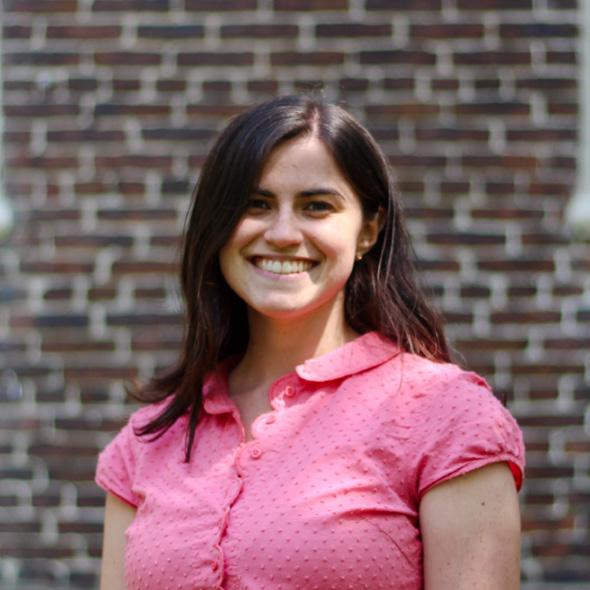
Ultimately, I didn’t have a concrete reason for everything I was doing. Most of the time I was trying things out and seeing what stuck. My friends and family back home were shocked that I now enjoyed a subject that I
thought I would hate and hated a subject I thought I would love, with little explanation from me. The truth is I was shocked too.
That is what makes “finding yourself” so hard. It’s not just about finding out who you are, but also letting go of who you expected yourself to be. While you’re becoming a new person, you are also morphing into something of a stranger to yourself and those who have always known you.
Since I was attending school in a foreign country a world away from
Maringa, keeping hold of my identity seemed as important as ever. I wanted to explore new passions and interests without losing touch with who I used to be. And for a long time, I held onto the idea that everything would sort itself out: I would eventually become an upperclassman and everything would make sense.
But that was not true.
I continued to bounce through and try to balance interests, and even as a graduating senior, I can’t see a world where I will stop doing so. Changing was really hard — but
changing also made me happier. While it was hard letting go of who I was and who I thought I was going to be, I am happy with the person that I am becoming.
While I can’t provide a polished quote to dramatically wrap my coming-of-age story, I can say that it hasn’t finished. Finding yourself is an ongoing process — one which is scary and challenging, but will be OK in the end. Real life doesn’t end on a freeze-frame like in “The Breakfast Club,” and that’s nothing to be afraid of.
“No matter where we are, who we meet or what we eat, sitting down for a meal can offer ... the rare promise of finding truly meaningful connections.”
REN from page 20
How after downloading Tinder for the first time, I, too, would encounter red flags galore, along with the dizzying senselessness of first attraction. How I, too, was a pretentious, insufferable fool, and would grapple with my own questions of meaning and meaninglessness, not in psycholinguistics class but in CSCI 0190: “Accelerated Introduction to Computer Science.”
I revisited “The Idiot” while working on this column, and it astonishes me how resonant certain passages feel to my time here at Brown. Here’s just a few:
“It was hard to decide on a literature course. Everything the professors said seemed to be somehow beside the point.” Shopping period, fall 2019.
“It seems to me that your sense of other people’s awfulness might be
compensating for your own sense of inferiority and fear of rejection.” Subtweeting myself.
“The croissant was crisp and soft and flaky at the same time. Just biting it made you feel cared for.” For me, it was a Blue Room muffin.
“In a corner, a girl was staring at a stack of flash cards with incredible ferocity, as if she were going to eat them.” Pre-med studying for organic chemistry, Sciences Library basement.
And of course, “I hadn’t learned anything at all.” Maybe the Open Curriculum was not as transformative as they say.
There were also passages that captured, with razor-sharp precision, the experience of writing this column. Like this one: “Suddenly it occurred to me that maybe the point of writing wasn’t just to record something past but also to prolong the present, like in ‘One Thousand and One Nights,’
to stretch out the time until the next thing happened.”
Or this one: “It can be really exasperating to look back at your past. What’s the matter with you? I want to ask her, my younger self, shaking her shoulder. If I did that, she would probably cry. Maybe I would cry, too.”
Though in the interest of not making my past (or present) self cry, I want to offer him some compassion too. Like most other tragic characters, my younger self was probably doomed to deny his fate. My younger self, who did not hear the message so obvious it was written in the title of the book, or at least, did not want to believe it: We were all idiots.
When a response to my first column appeared in the paper the week after, written by two student members of the first-year reading committee who noted respectfully that I had missed the point of the book entirely,
I dismissed the writers as bitter. In the end, of course, they were right.
Batuman published a sequel to “The Idiot” last year. It’s titled “Either/ Or,” and it follows Selin’s sophomore year. I have not read it yet, though I plan to. As a wrinkly old senior and soon-to-be graduate, however, I will never be able to read it as I once read “The Idiot,” as a prophecy to ignore.
I tell myself I know better now, that if Batuman had already written a sequel to the sequel of the sequel of the sequel, a book about Selin’s life post-college, I would read it and see myself in her story. Heed the warnings. Find solace in her company. See in its incoherent narrative a guide to the incoherence of life itself.
But if there is one thing “The Idiot” taught me it is this: I know better than to think I know better. I have been an idiot all along.
COLLINS from page 21
had to forgo my planned study abroad at Goldsmiths, University of London. Instead, doctors twice my age asked me to make life-altering decisions. They asked me to decide between a PET adaptive ABVD approach or a more aggressive chemo regimen. They asked me to decide between Dr. Amengual at New York Presbyterian or Dr. Moskowitz at Memorial Sloan Kettering. Decide, they said, between your life and the life you thought you had.
If the pandemic taught us anything, it’s that tomorrow makes no promises to us. We all now know what it means to have our entire lives upended. We all know what it feels like to be utterly uncertain about the days, months and sometimes years ahead of us. Even if catastrophic events in our lives obscure the future ahead of us, we still must make decisions. While
people will tell you that our future selves will thank us for the decisions we make now, I don’t think that statement is true. The decisions we make right now, the places you travel, the kind of chemotherapy regimens you sign off on, they’re all for you. The you that you are right now. It’s true that you won’t always be this version of yourself. I know I’m not the same girl that went to the Third World Transition Program in 2019 and sat on foam mats in Sayles Hall. However, it’s only by being truly attentive to the present that we can make decisions in the first place. After all, I’m only here because I listened to my body when it told me something was wrong. Now I’m a woman who is in remission. I’m a woman who changed.
I believe that decisions are the catalyst for change. Every decision we make becomes the spark that forges new art, new technology, new people and new relationships. Sometimes
we make decisions because we must. Whether it’s to save our lives or someone else’s, we have to decide what our next step will be. That decision means everything, but so do the deciding factors. Who are the people around you? What are your resources? What are you fighting for? Sometimes, the fact of the matter is, we are starting — even running — at a deficit. Though I’m in remission now, the movement isn’t over. I will receive PET scans every three months for a while to ensure my cancer doesn’t come back. The entirety of summer 2022, I fought hard against trauma induced anxiety and depression. I still deal with these things today. Everyday I decide to keep pushing, but I don’t do it alone.
My mother was my primary caregiver while I was in treatment. Her resilience, unwavering love and support got me through the darkest moments. My mother, an entrepreneur, supports families of color in indepen-
dent schools, and she got me through Brown. On days when I am paralyzed by fear, and in moments when I can’t see what lies ahead, I think of her. I repeat in my head, “I am someone’s baby. Somebody loves me. I am my mother’s baby. Many people love me. I know I am not alone. I have a lifeline that is my family.”
I am Keith Collins and Gina Parker Collins’s daughter. I am Chaz Collins’s sister. I am Paige Parker and Ted Parker’s niece. I am Preston Parker and Paeten Parker’s cousin. I am loved, and whatever decisions I must make, I know I don’t have to make them alone. Class of 2023 — we are all deeply loved. I love each and every one of you for forming the Brown community that helped forge me into the woman I am today. May we all have the strength, support and love we need to keep making the decisions that continue to make our lives. We have arrived.
RAUSCHENBACH from page 22
roommate, give a quick hug to your best friend on your way to class or to pretend to admire the architecture of Friedman Hall as you avoid making eye contact too soon with the person walking toward you.
The Main Green, and the time we’ve spent there together, is a reminder that our time at Brown has been so much more than a purely academic endeavor. And it is the place I missed most when the pandemic whisked us far away from
BEDNARZ from page 21
Those few minutes of silence in the Omni elevator made up most of the daily human interaction I got. I resolved that I would turn them into something memorable.
It started with simple questions: “What floor are you headed to?” The initial conversations were quick and perhaps a bit stilted, but in the small community of the Omni, faces passed each other plenty of times, and it wasn’t long before I had people who I looked forward to running into. I quickly learned that my fellow elevator passengers were, if any-
MCGOUGH from page 22
and invitations.
This is not to say everyone needs dozens of personal connections to feel socially satisfied, but we all can learn from those who successfully juggle many close friendships. Being purposeful about the effort we put into our relationships is not only important in the practical work of planning get-togethers and staying in touch, but signals to our friends that we value them, that they’re more than just entertaining side attractions in our lives. Make those close to you feel valued and like more than mere extras in your
campus during the spring of my firstyear.
As Amanda Mull wrote in The Atlantic in 2021, the pandemic made it nearly impossible for us to socialize or engage with anyone other than our closest friends and family. She argued that there had been a nearly universal collapse of what she called “peripheral connections,” or those friendships and relationships you have with people you might not know that well.
“Peripheral connections tether us to
the world at large; without them, people sink into the compounding sameness of closed networks,” Mull wrote.
Working to build the types of communities, like those of the Main Green and those of my childhood, are a pathway to the type of world we’d all prefer to live in. We must work relentlessly to preserve, deepen and grow our relationships, strengthening those we have with people we are already close with and opening ourselves up to others who we may not know.
I have personally seen the importance of strong relationships when times are hard. And I think most students at Brown share that experience too. I hope that understanding guides our choices into the future.
As we, members of the class of 2023, go forth, we must remember our time at Brown and work to cultivate a Main Green community of our own beyond College Hill — where there’s laughter, good conversation, rest from work and friendship. Our world needs it.
thing, even more excited to engage than I was. Anonymous peers turned into people with stories: Halle, who described what the underlying theme of her artwork was; Evan, who was so committed to crew that she brought her very own rowing machine into her hotel room; or Ben, who helped me understand just what exactly was happening when GameStop’s stock was going “to the moon.”
In the most physically isolating and lonely time of most of our lives, my days were filled with people again.
Our class is composed of future doctors, writers, scholars and trailblazers
of all forms. But more importantly, we are humans, each offering stories of our lives, all of which have led us to this very moment. Stories that bring us closer to each other. Stories that I would have never heard had it not been for making that initial conversation.
Textbooks can teach us meteorology, but they can’t commiserate with us over how dreary the rainy Providence weather can be. ChatGPT can help us solve math problems, but it will never be the person who helps you see your selfworth after failing a math exam. And freshman year icebreakers will never not
be awkward. But at least we can bond over the shared experience.
The Brown elevator that started at freshman year is now on its final floor. The bell has chimed, the doors are opening and our next steps lie ahead. As we prepare to venture off in an array of dazzlingly diverse directions, let us not forget our journey up through the many stories. Let us cherish the memories we hold with our fellow passengers. And as we go our separate ways, let us look forward to the conversations, the stories and the friends that lay on the path ahead of us.
life story, and you will be rewarded with their persistent companionship.
The relationships we kept — and those we didn’t — will define college in our memories. Every one of this year’s Saturday parties or intimate movie nights will be remembered by those we shared them with, their infectious laughter and the comforting feeling of belonging.
But, think of how you remember those same events from your first year. Is there someone there who you’ve lost contact with? Perhaps there’s a somber feeling there now, and each memory you made with that person will be forever colored with a slightly mournful sense of loss.
Don’t let all your memories from
Brown become stained with that negativity. Years from now, you will look back on senior spring the same way you look back now at freshman fall.
Of course, you’ll remember the crummy Spring Weekend weather and the final group presentations just fine. But you do not want to look back on these days and feel that you lost something along the way. You’ll want to look back on these days and remember not what great friends you had, but what great memories you made with the friends you kept. You won’t want to awkwardly pass an old friend on the street and wish you still knew them.
As we go our separate ways, main-
taining our relationships will get more taxing, demanding more purposeful and directed effort. But it will be worth it as we go forward, secure in our supportive and collaborative networks, setting a solid foundation for the rest of our social lives. It will be worth it when we look back on our time at Brown and remember it not as a pitstop, but as a launching pad. It will be worth it when we realize that symbolically leaving through the Van Wickle Gates didn’t mean leaving anything behind, but just walking into the next phase of our lives with our closest friends.
Stay in touch.

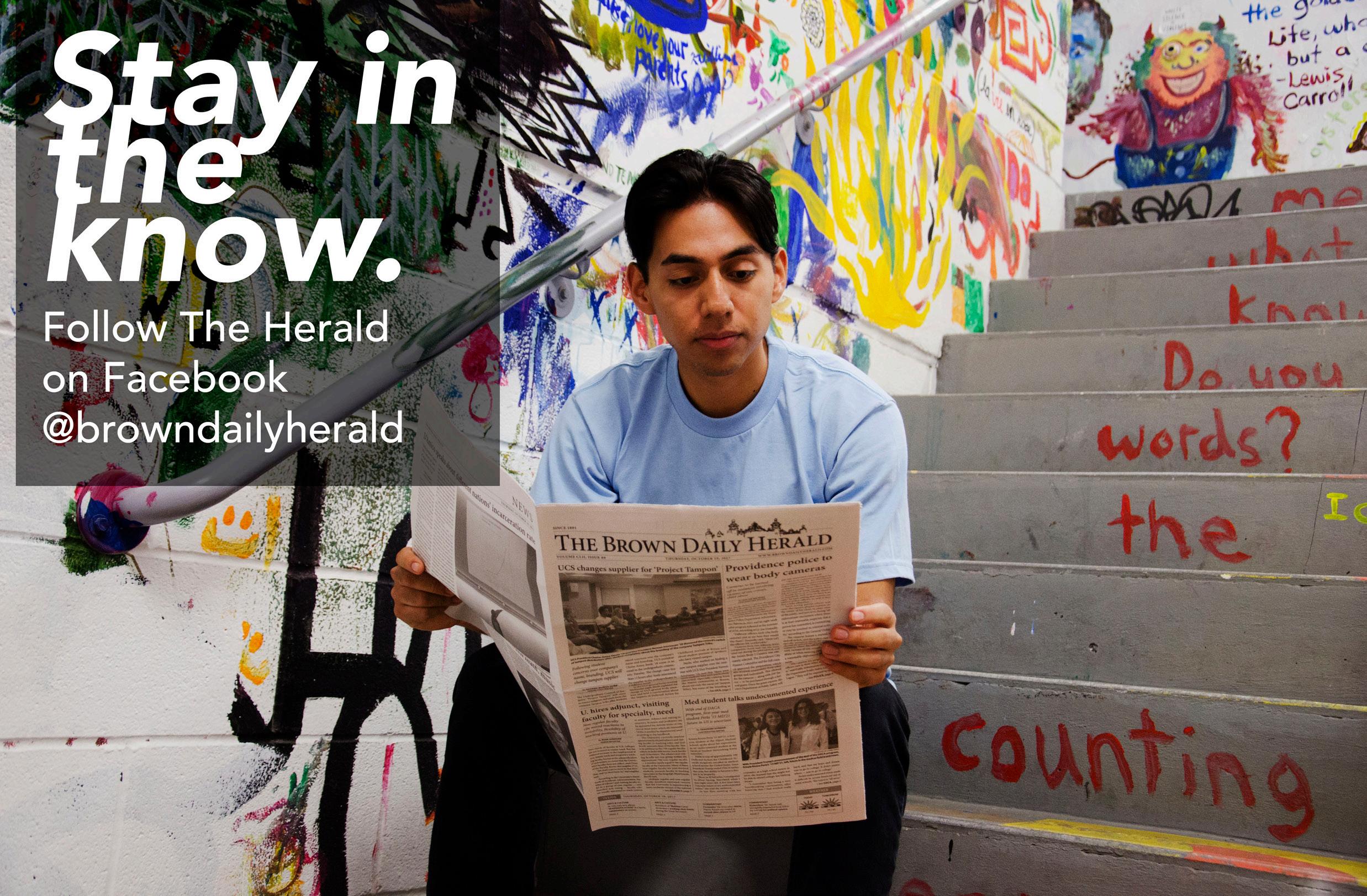
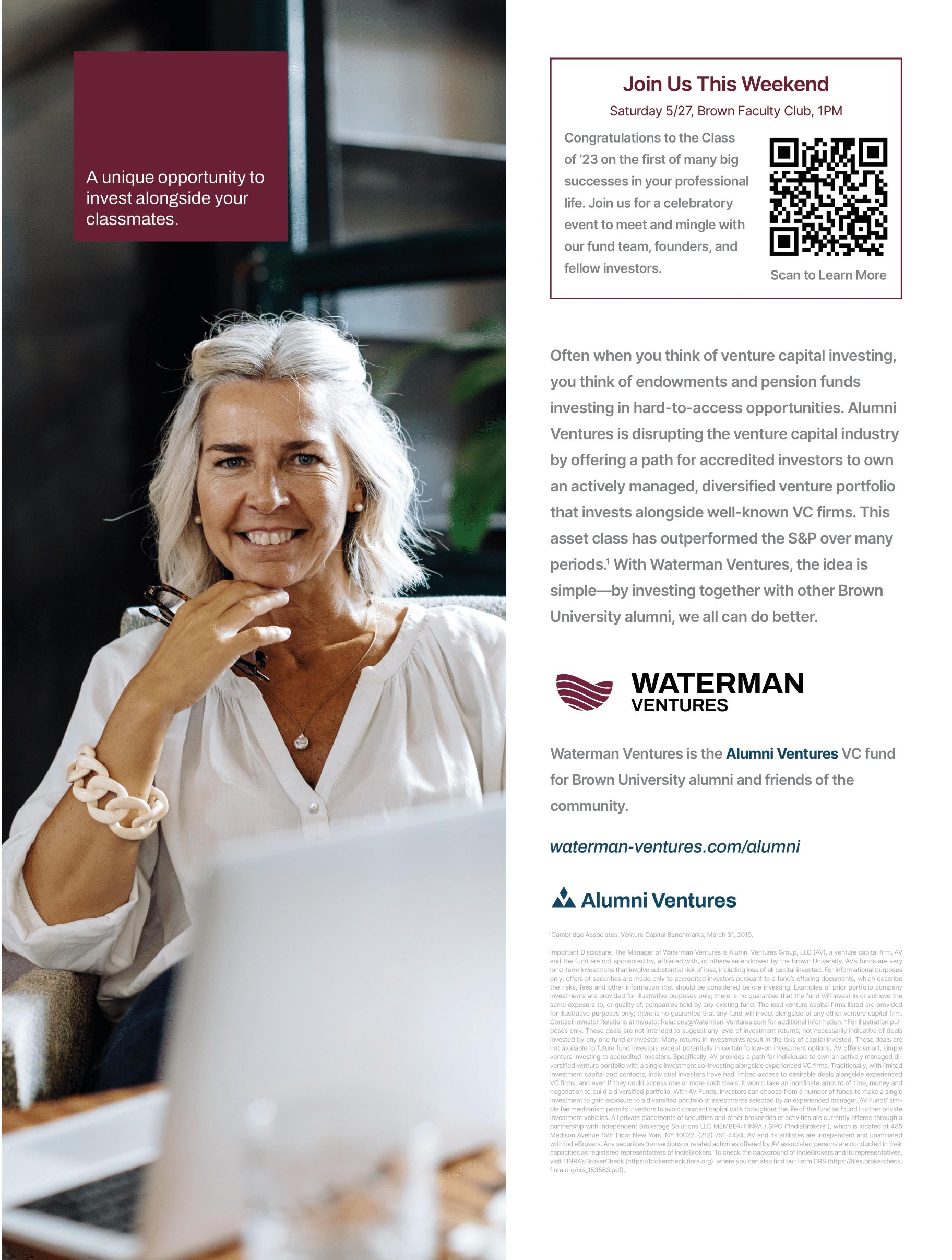
Your one-stop shop for Brown apparel and gifts, as well as books, technology, and more!

The Brown Bookstore carries a wide range of great brands including Nike, Champion, Yeti, Tervis, Hydroflask, Apple and Lenovo.
Class of 2023 Senior Tee available here! (Also available as a crewneck sweatshirt.)
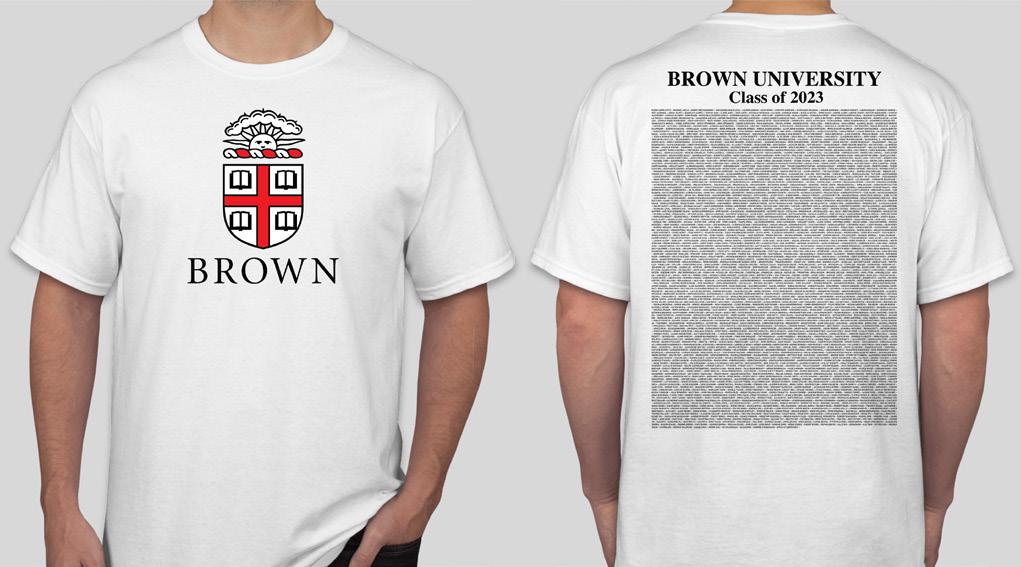
Our Vintage Collection combines the best of classic styles and classic Brown University marks in apparel, accessories, and home goods to bring that vintage Brunonian touch to your life. These make perfect gifts for any student, alumnus, or fan!
